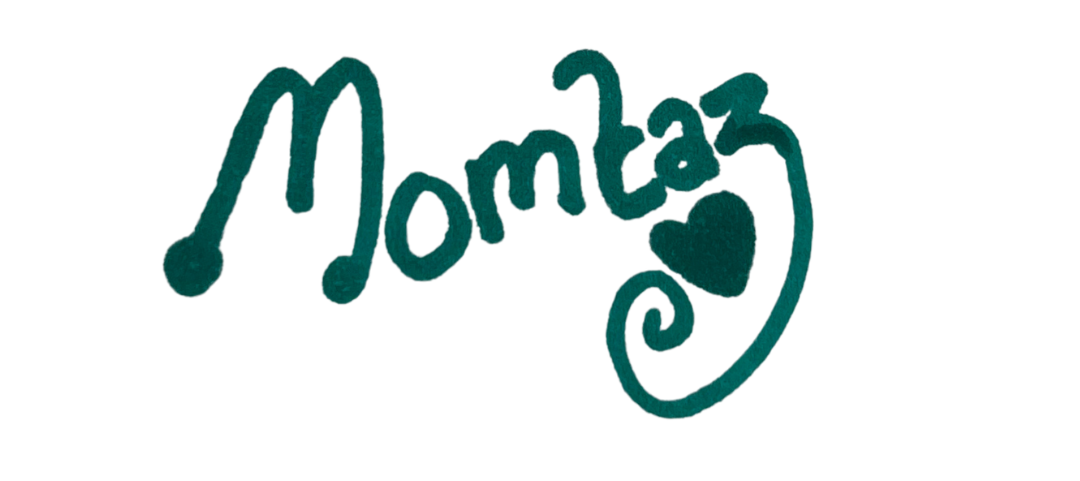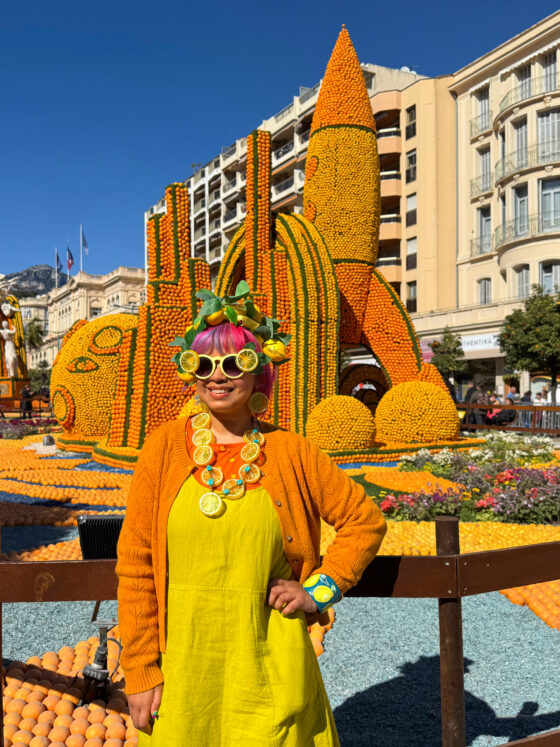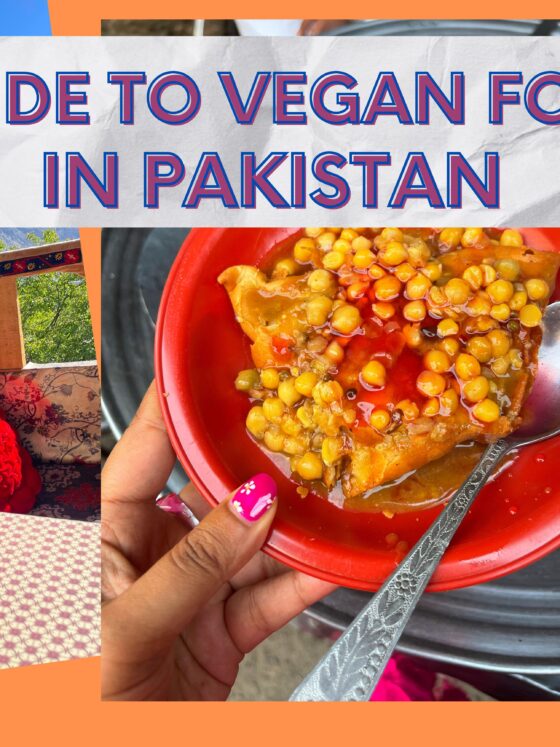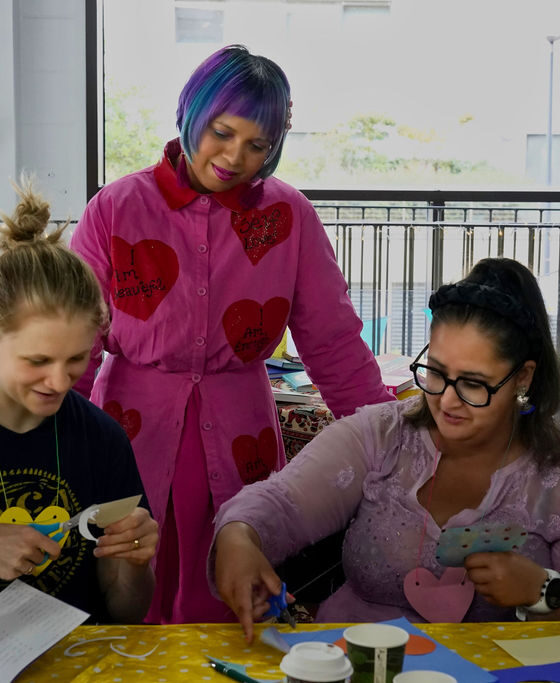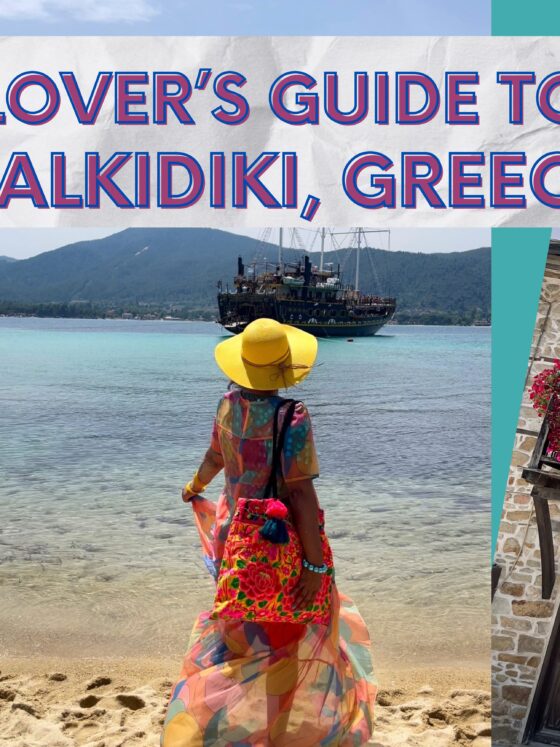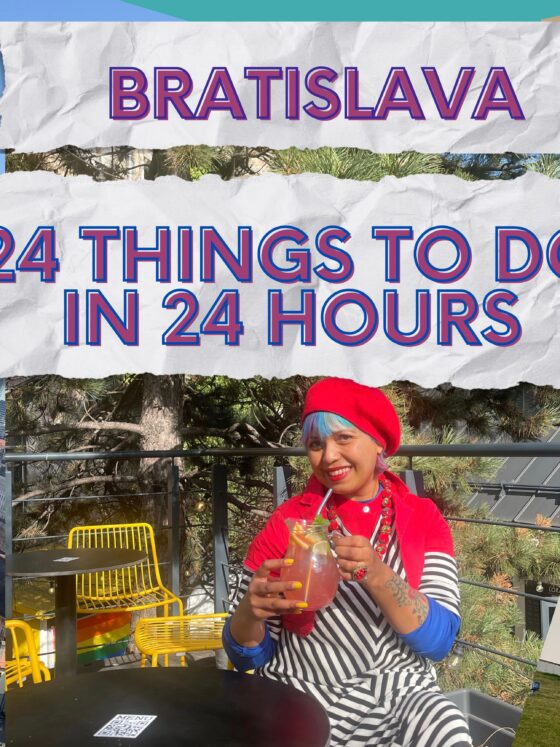A Colour Lover’s Guide to Pakistani Truck Art
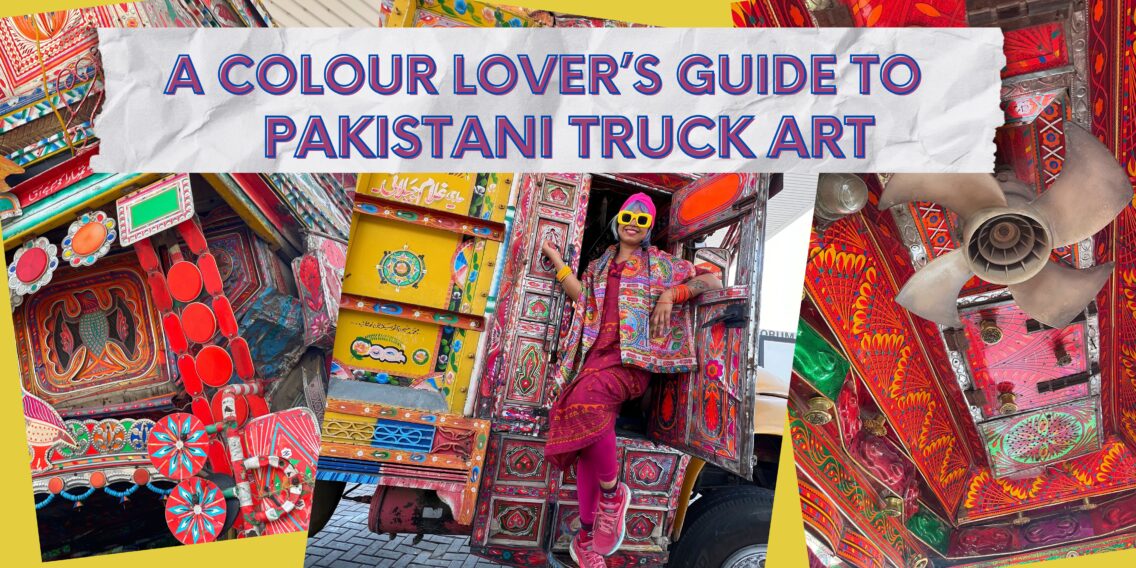
I can’t believe I’m writing this. I finally ticked off the number one goal on my travel bucket list: to see Pakistani truck art in Pakistan.
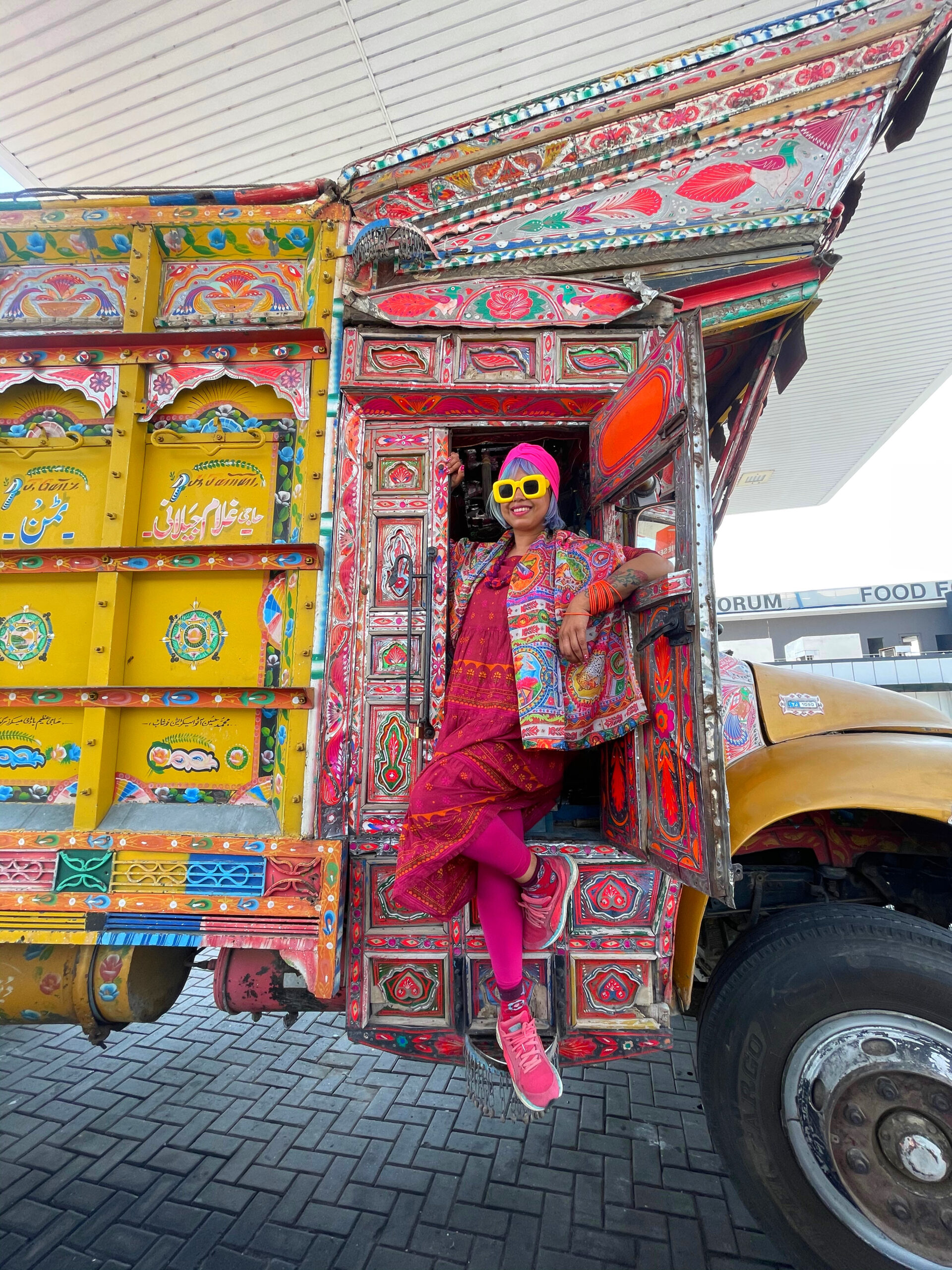
I’ve long been obsessed with the images of colourful Pakistani truck art I’ve seen online. To witness it for myself in its homeland is an experience I’m still pinching myself about.
My first long-haul destination since the Covid pandemic hit in 2020, I’ve just come back from an epic vacation in Pakistan. As well as visiting the cities of Lahore and Islamabad, I also spent time in Gilgit-Baltistan, in the north of the country. I’d heard that this was the best place to see Pakistani truck art. I never imagined I would visit such a far-flung destination – but I did!
So, for the first of my blog posts from Pakistan, I’ve of course chosen Pakistani truck art.
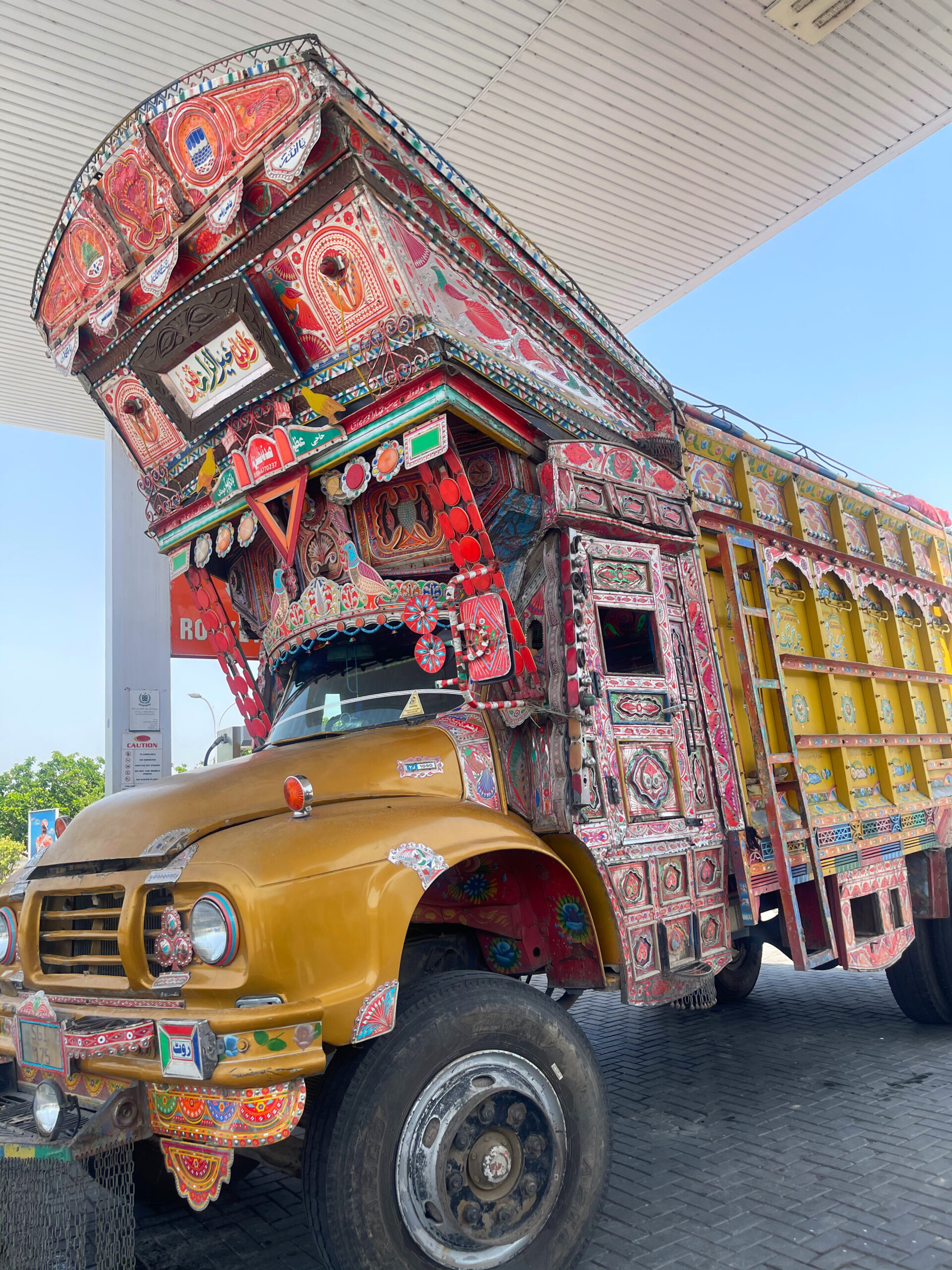
In my guide I explain all the basics you need to know about this traditional folk art technique including:
- What is Pakistani truck out?
- Where to see Pakistani truck art
- Where to buy Pakistani truck art
- How to try Pakistani truck art yourself
Fasten your seatbelt as I take you on a colourful journey through the vibrant, creative world of Pakistani truck art…
What is Pakistani truck art?
One way of knowing that you’re in Pakistan is that the vehicles look different. And by different, I mean better than anywhere else!
The trucks driven by long-distance drivers in Pakistan are decorated in colours, textures and patterns. They brighten up the streets by day and night, when they light up – we’re talking strings of rainbow lightbulbs adorning their exterior.
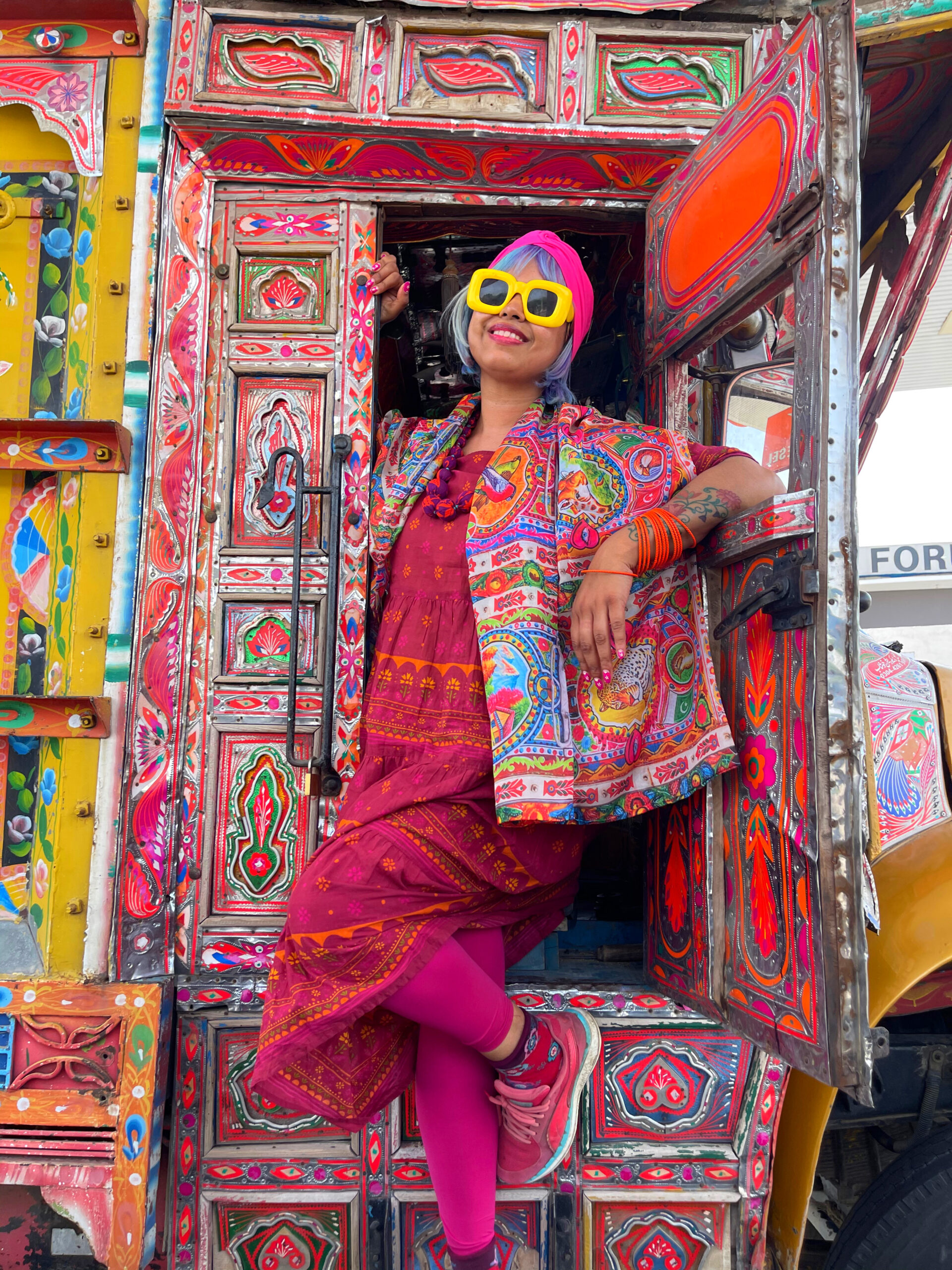
Truck art is engrained in the nation’s psyche. Every truck is different but has a distinct aesthetic. Each truck tells a story often connected with the truck driver or the region they are from. But the aesthetic isn’t only reserved for trucks. The joyful style has been applied to other modes of transport from public buses to private cars. And in recent years all manner of other things too.
But before I go into that, let’s start at the beginning by explaining what truck art is all about and why it began…
The history of Pakistani truck art
Why did truck art start?
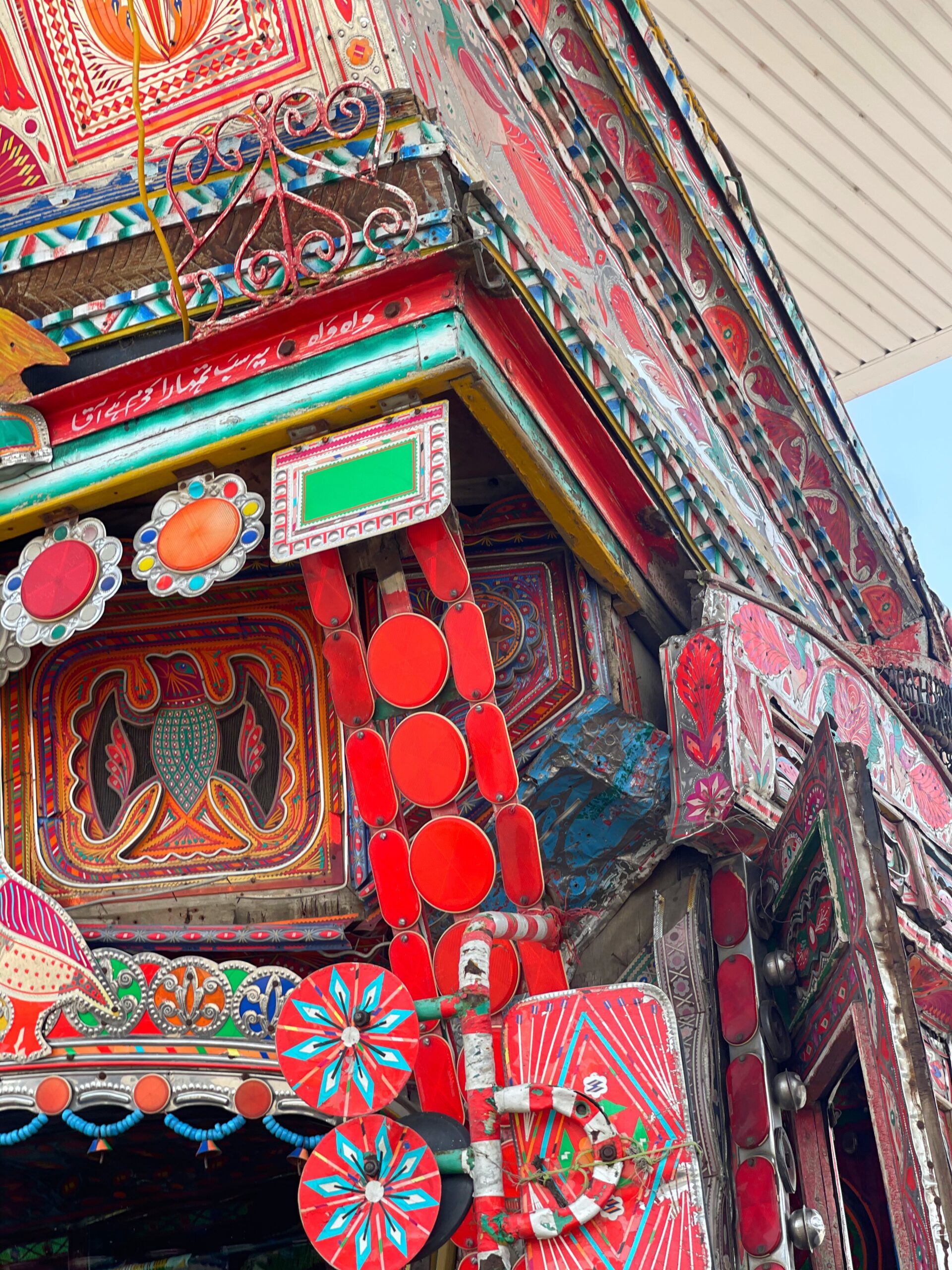
When trucks gained prominence in Pakistan as a convenient way to transport goods in the 1920s, drivers started painting their trucks as a means of personalising them. But it wasn’t just to look good. These drivers were away for long periods of time and decorating their trucks reminded them of home. Sikh drivers would incorporate images of their gurus to bless their journeys while Muslim drivers painted images of Sufi saints, as a means of protecting them. Some truck drivers even referred to their trucks as their wives and decorating them was a way of showering them with respect and appreciation.
Changing styles of Pakistani truck art
After independence in 1947, a patriotic theme began appearing on trucks, celebrating the visuals of Pakistan like the landscapes, flowers and animals.
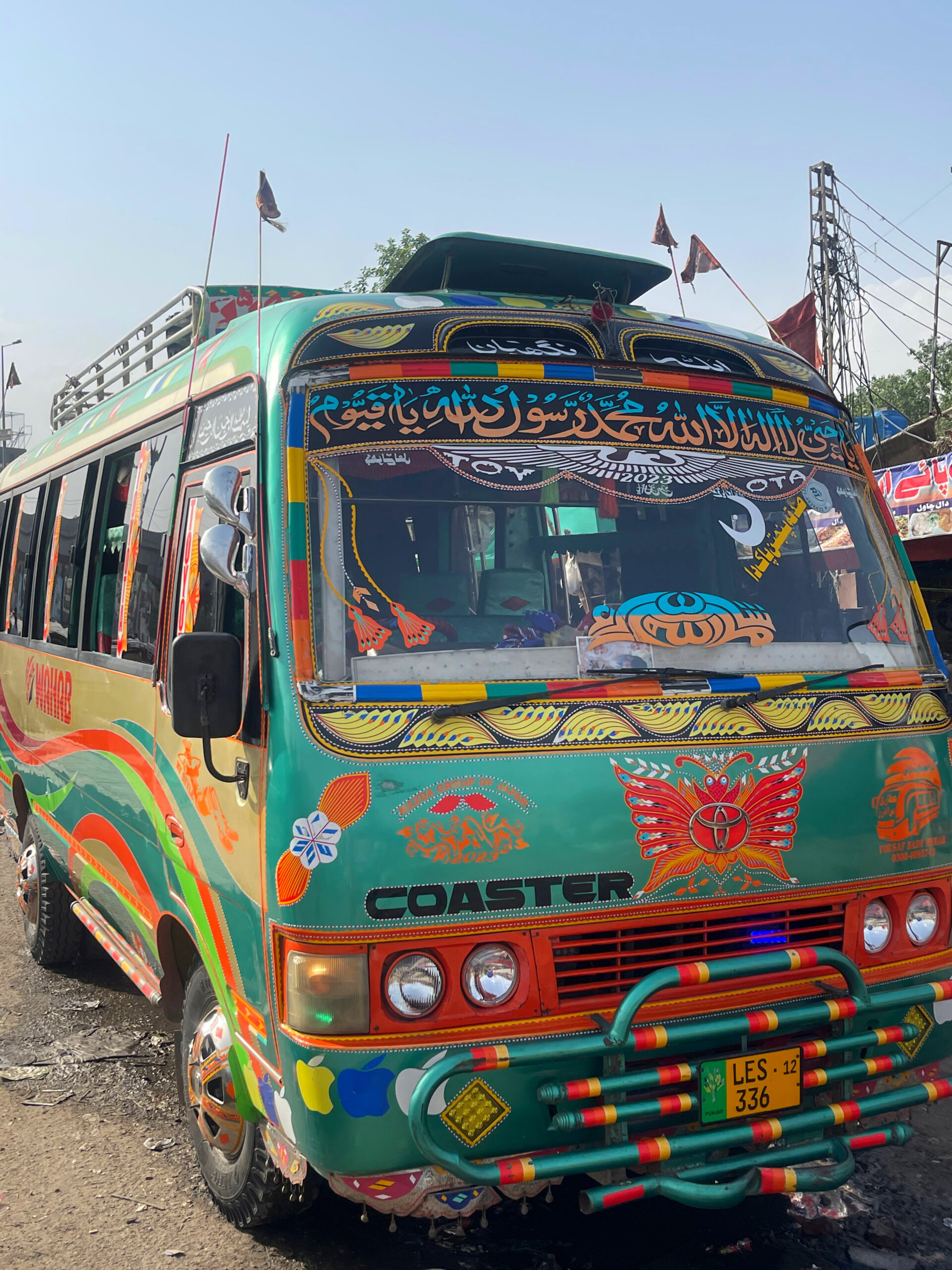
During the 1960s the trucks became more political and carried images of political leaders which helped share propaganda and influence decision-making. But it wasn’t long before celebrities like film stars started appearing on trucks. The first international, non-Pakistani to appear on a truck was martial arts star Bruce Lee.
One aspect that remained elusive though was the artists that became truck decorators; they were largely unknown; despite thire art being appreciated by thousands of people daily. This has changed and master artisans now known and respected, but the earliest artists were not usually credited.
Truck art as communication
Truck art has historically been used as a form of communication; a way of spreading news. Trucks can reach areas that are often inaccessible by other means. They can even access places where there are no phone lines or internet so they play a key role in getting messages across.
In a pre-social media age for example, a major story such as Pakistan winning an important cricket match, could be painted on a truck. Then, as the wheels hit the road, passersby would see the images and understand the celebration.
Truck art for a good cause
In 2019, Roshni, a missing person’s helpline in Pakistan, teamed up with paint brand Berger paints and artist Samar Minallah Khan who painted the faces of missing children on trucks. 3000 children go missing in Pakistan each year and it was hoped the artform could help them be found. The campaign proved successful and in the first month, 20 trucks were painted which led to three children being found. Since then, over 100 children have been reunited with their families, all thanks to their portraits appearing on trucks.
Types of Pakistani truck art
There are different elements to Pakistani truck art that you’ll see on trucks and in truck art-inspired pieces. Artisans often specialise in a specific technique, associated with different regions in Pakistan. These techniques are often combined in one vehicle.
Woodwork
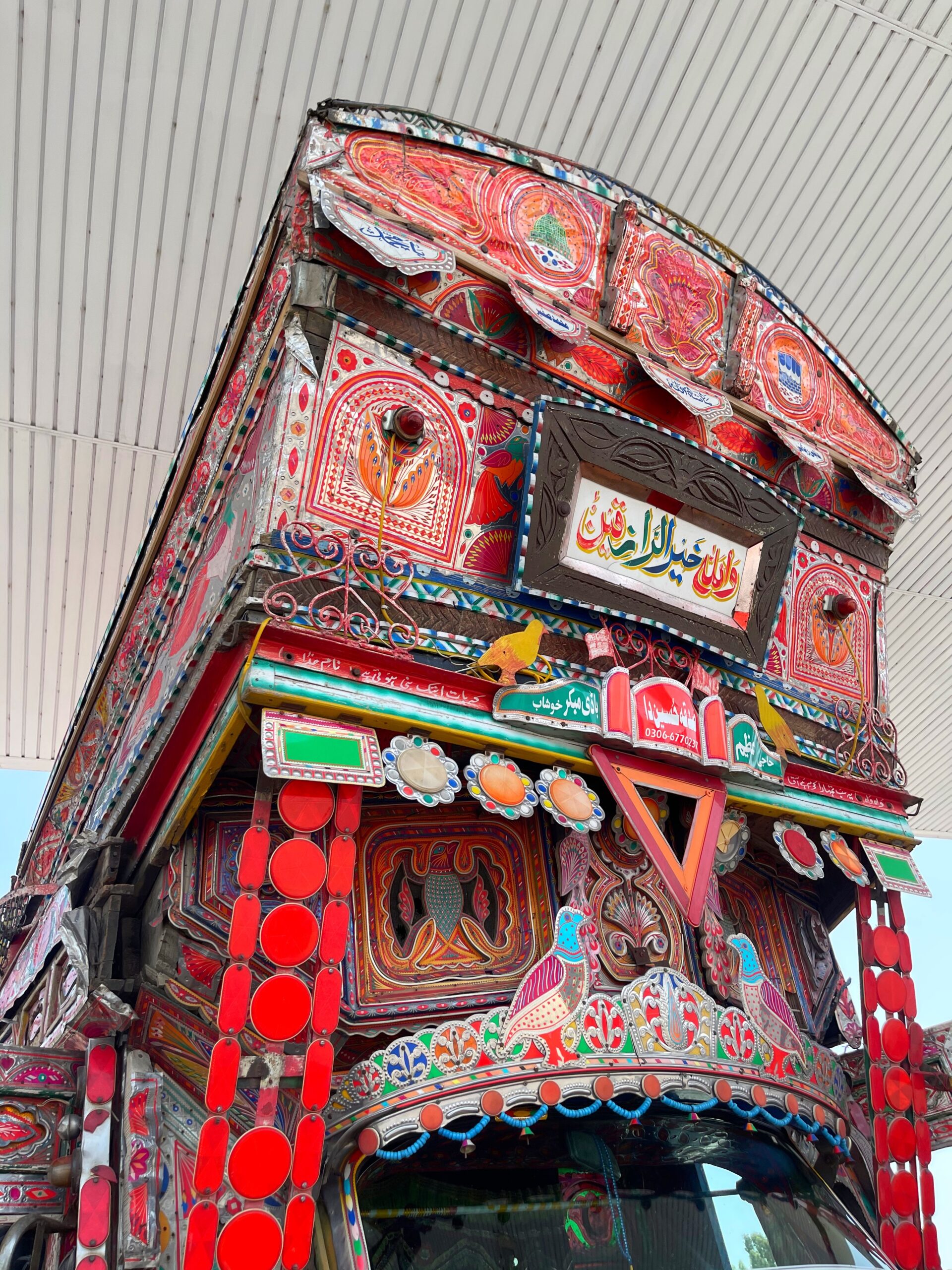
Woodwork such as wood carved panels tends to originate from Peshawar in North West Pakistan and is more commonly seen on older trucks. So like this one I saw, a truck may have a large wooden hood above the cabin, where the driver sits.
Painting
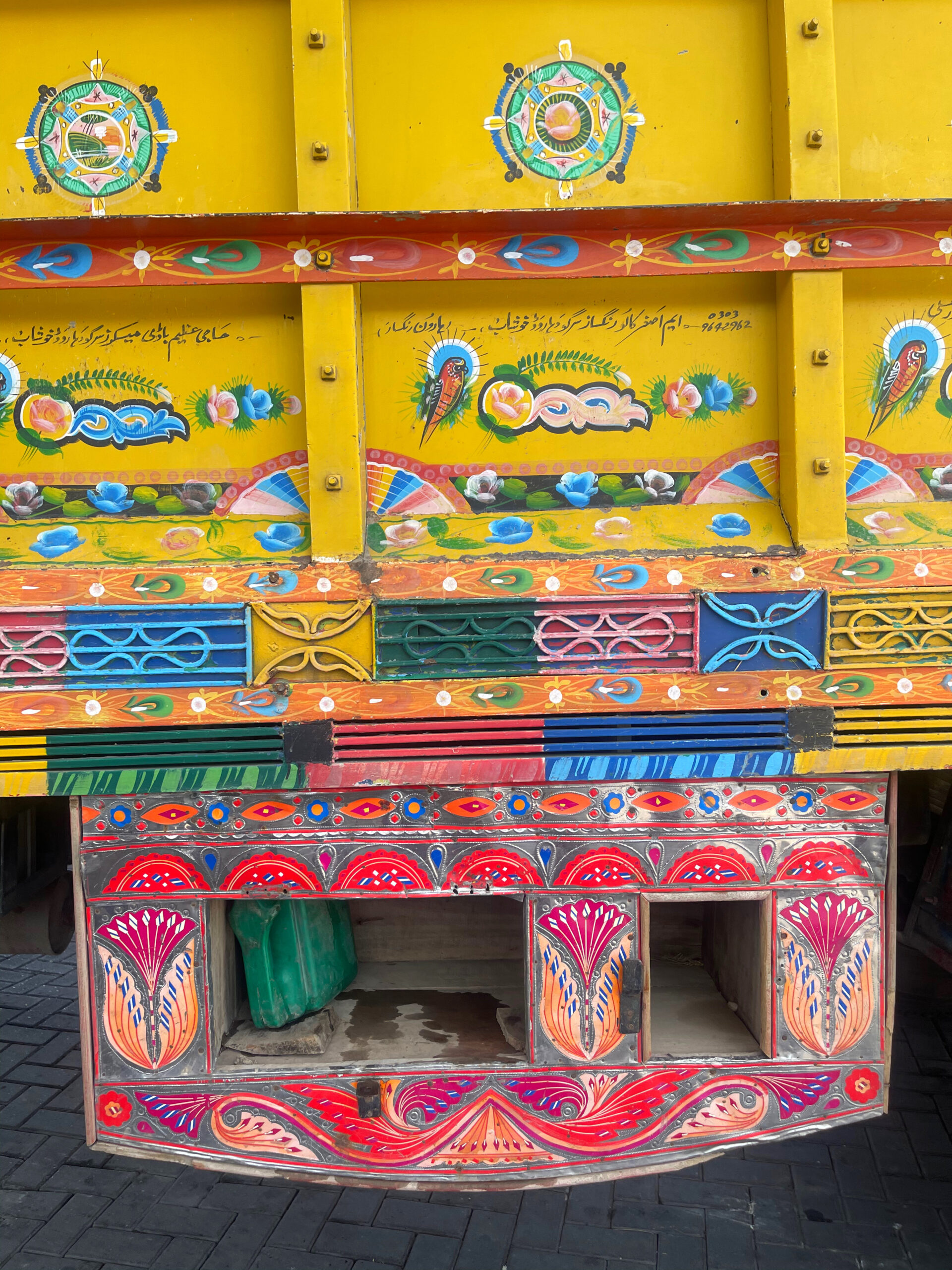
Traditional folk art paintings are the specialism in Rawalpindi. Truck art painters are regarded as Master Artisans who have studied their craft for years. Sadly, just like other folk art practices around the world, it’s on the decline and that’s why you’re less likely to see colourful hand-painted trucks on your travels. Instead, it’s common to see paint that’s faded from years gone by.
Stickering
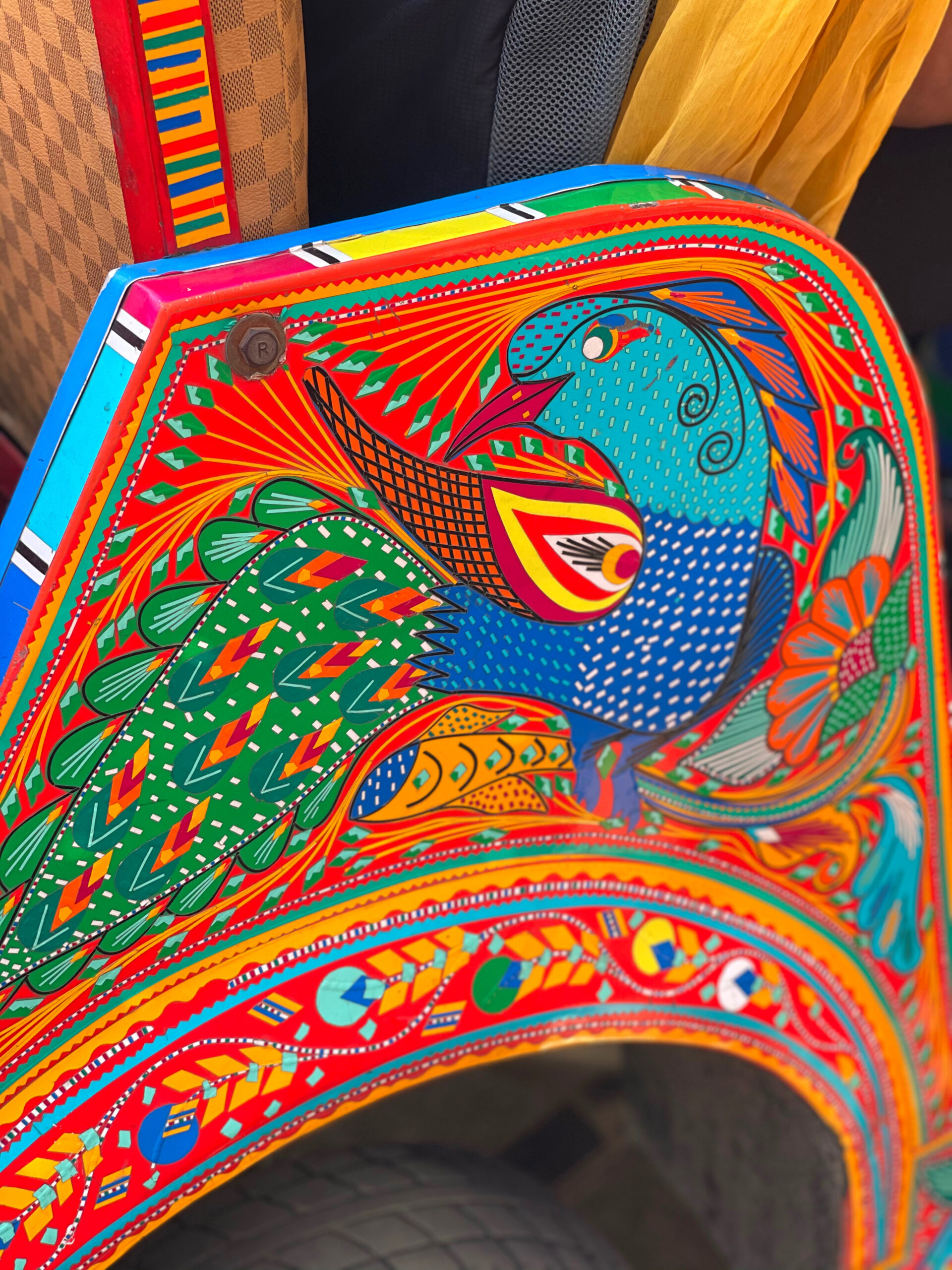
Vinyl stickering and metal embossing are a combined technique, also called chamak patti and is synonymous with Karachi. ‘Chamak patti’ translates as ‘shiny stickers’ but it’s usually the metal that adds the shine while the vinyl elements comprise bright colours.
Stickering is an intricate craft form where sheets of metal are decorated with colourful vinyl stickers cut into shapes. The sheets are also embossed to create texture. It was the most common type of truck art I saw on my trip.
Interiors
While these details can be seen on the exteriors, the art doesn’t stop on the outside.
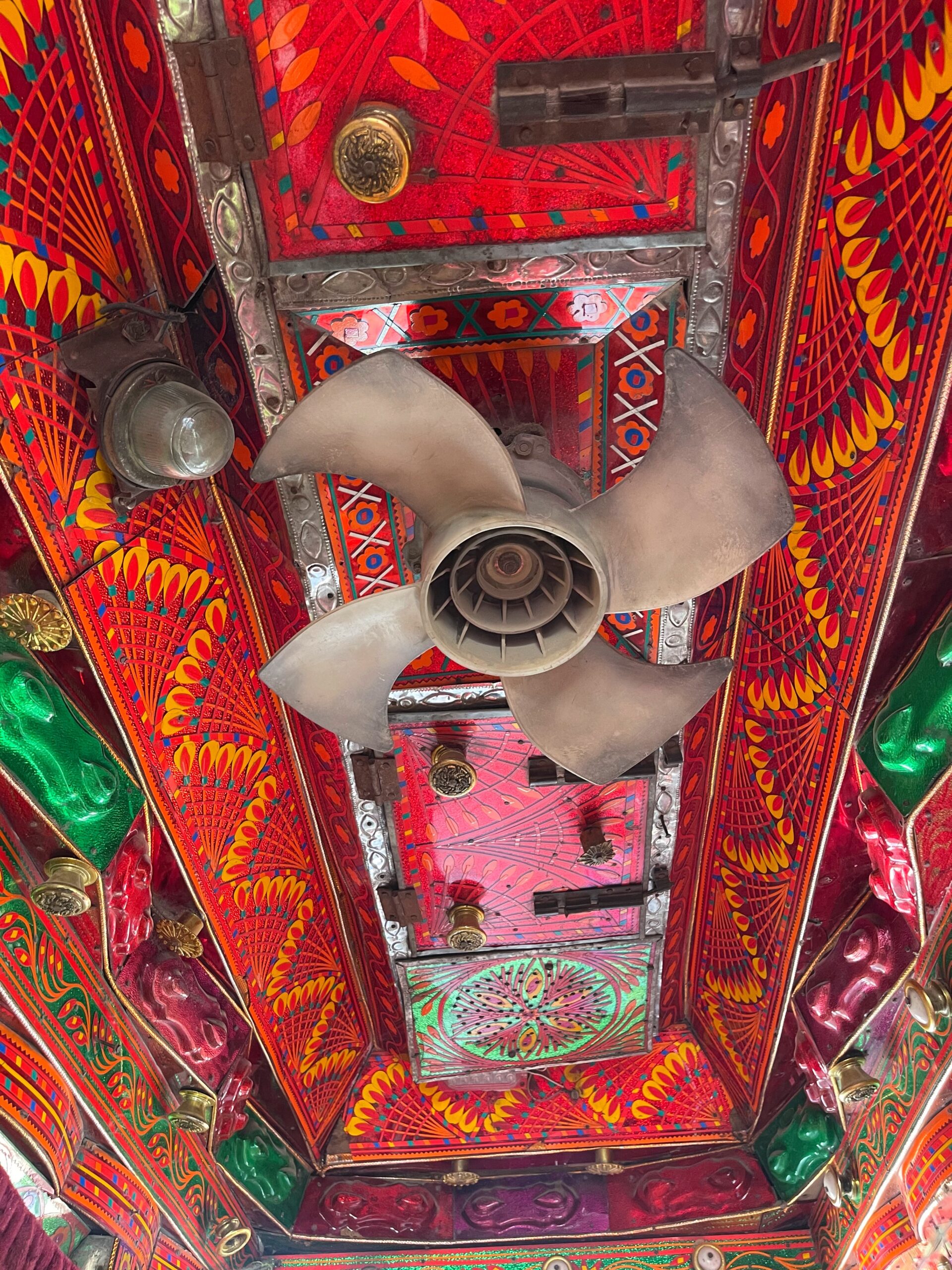
Inside, the trucks are just as lovingly decorated with soft furnishings.
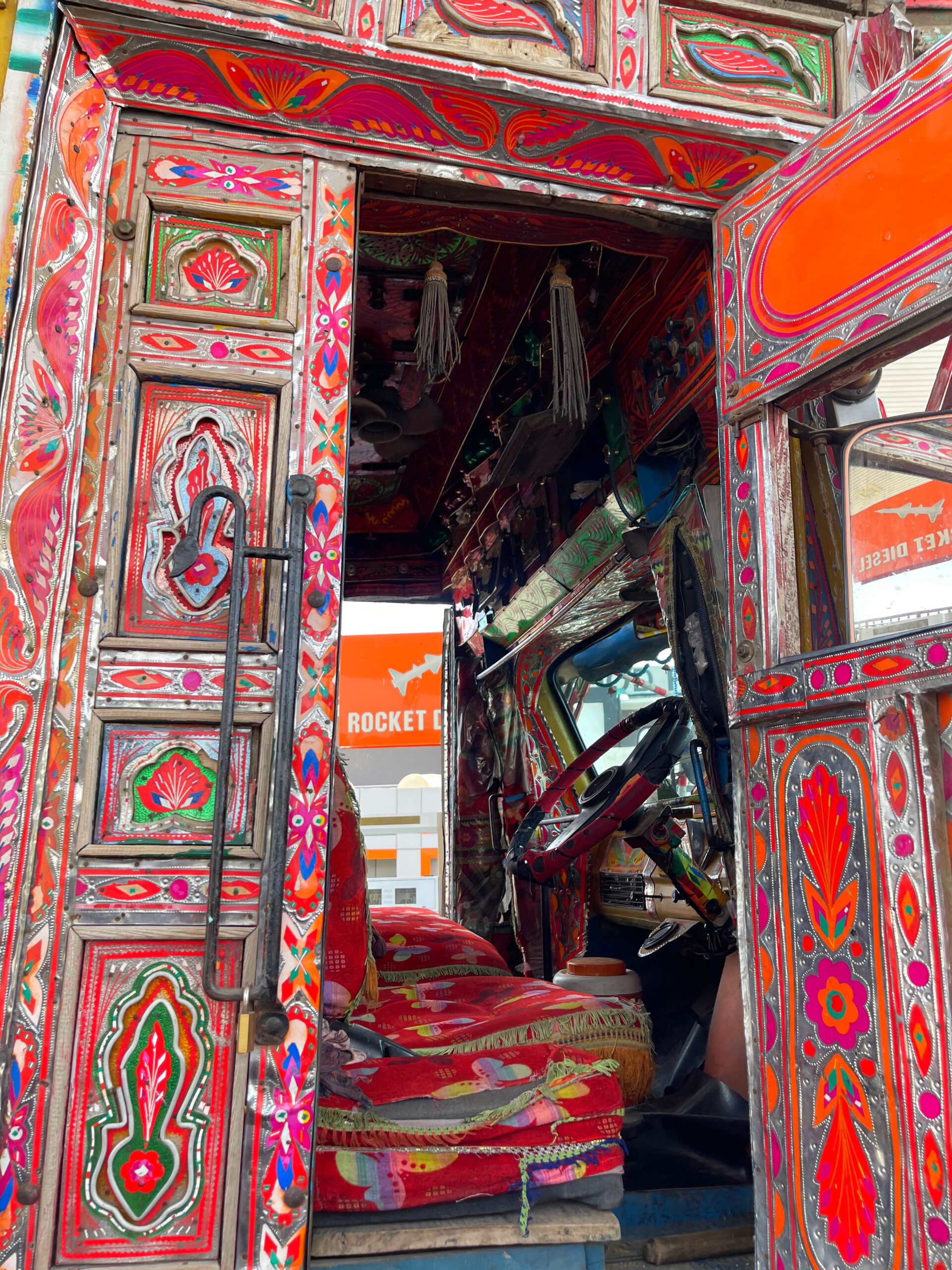
Ceilings are covered in fabrics, while windows are dressed with curtain, seats have cushions and all manner of trinkets are hung up and displayed.
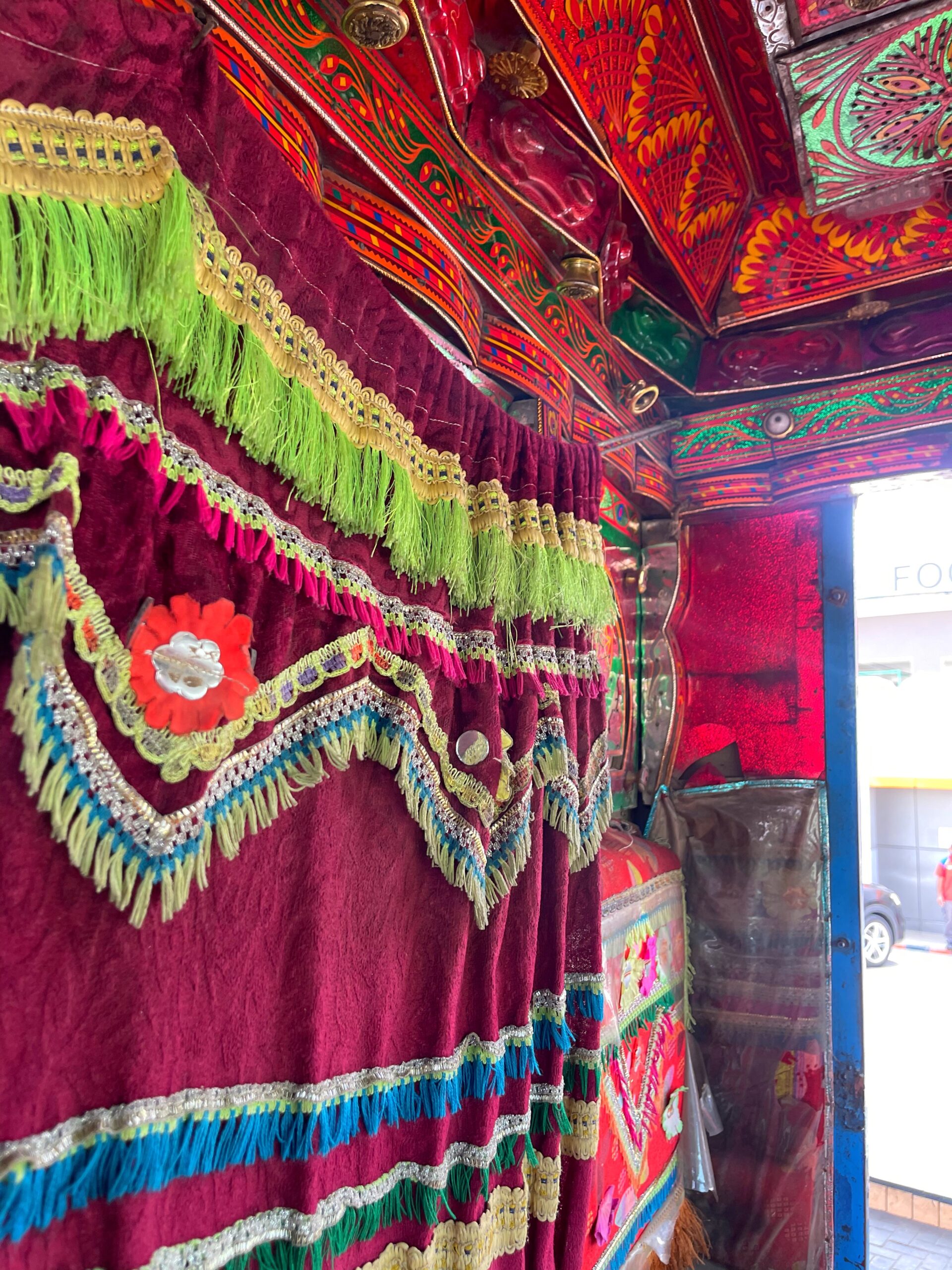
Where to see Pakistani truck art in Pakistan
Typically you’ll only see trucks on the roads that trucks typically travel on, so you won’t spot them in the city centres. But head to the highways and mountains and you’ll see colourful trucks sweeping past you. Pakistan was the only destination I’ve been to in the world where I didn’t want to fall asleep on the long drives as I didn’t want to miss seeing them.
My enthusiasm didn’t wane; every truck was a masterpiece, even the older, faded ones have a charm about them. When I did spy newer more sparkling trucks, or several colourful trucks go by in a row, it was a joy to behold. I couldn’t stop beaming at their beauty.
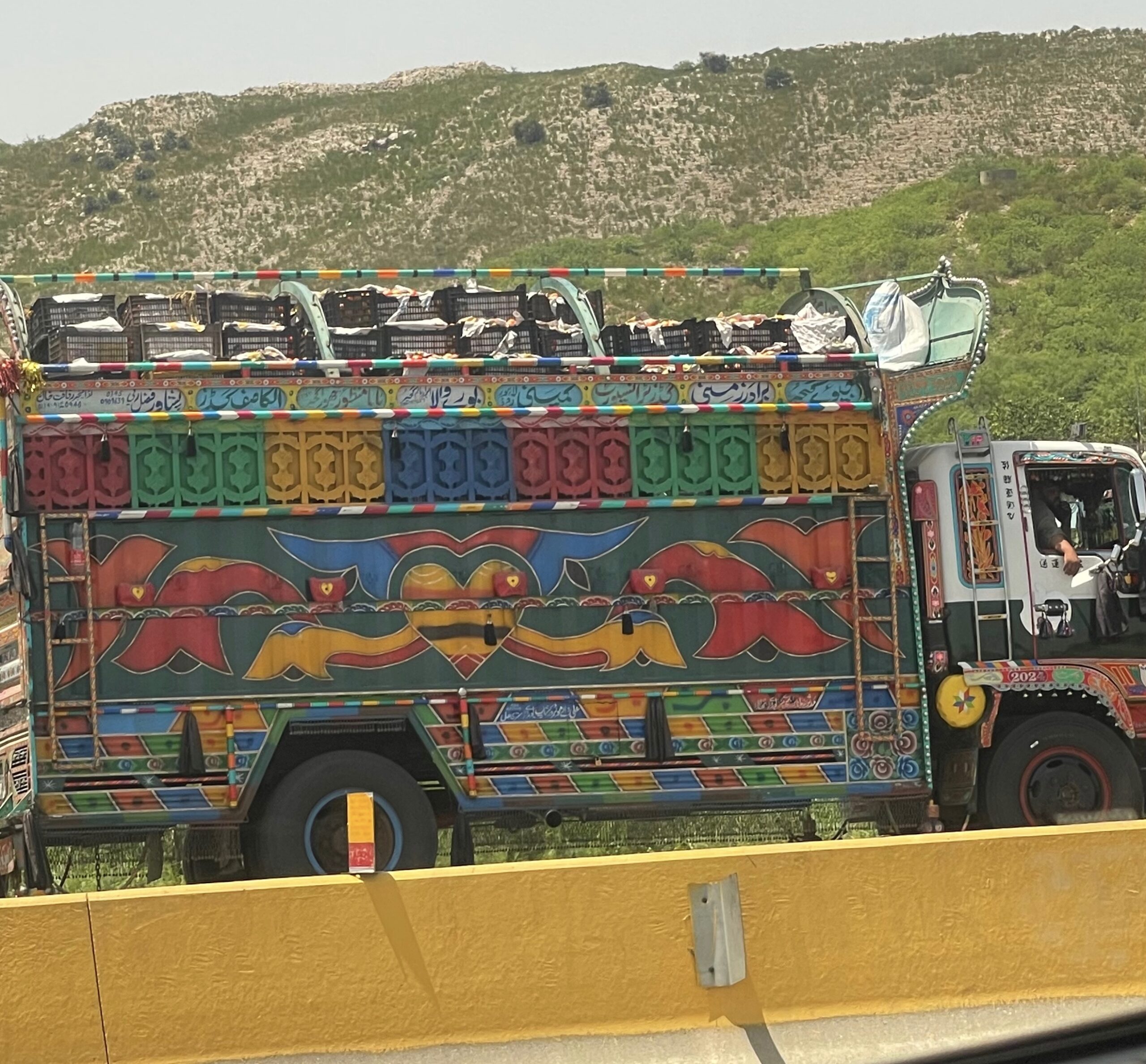
The only problem was, the trucks are always on the move. If you’re trying to take photos of them, it’s most likely going to be when you’re a passenger looking out of the window. So, with that in mind, I don’t have too many photos of trucks because most of my pictures ended up blurry!
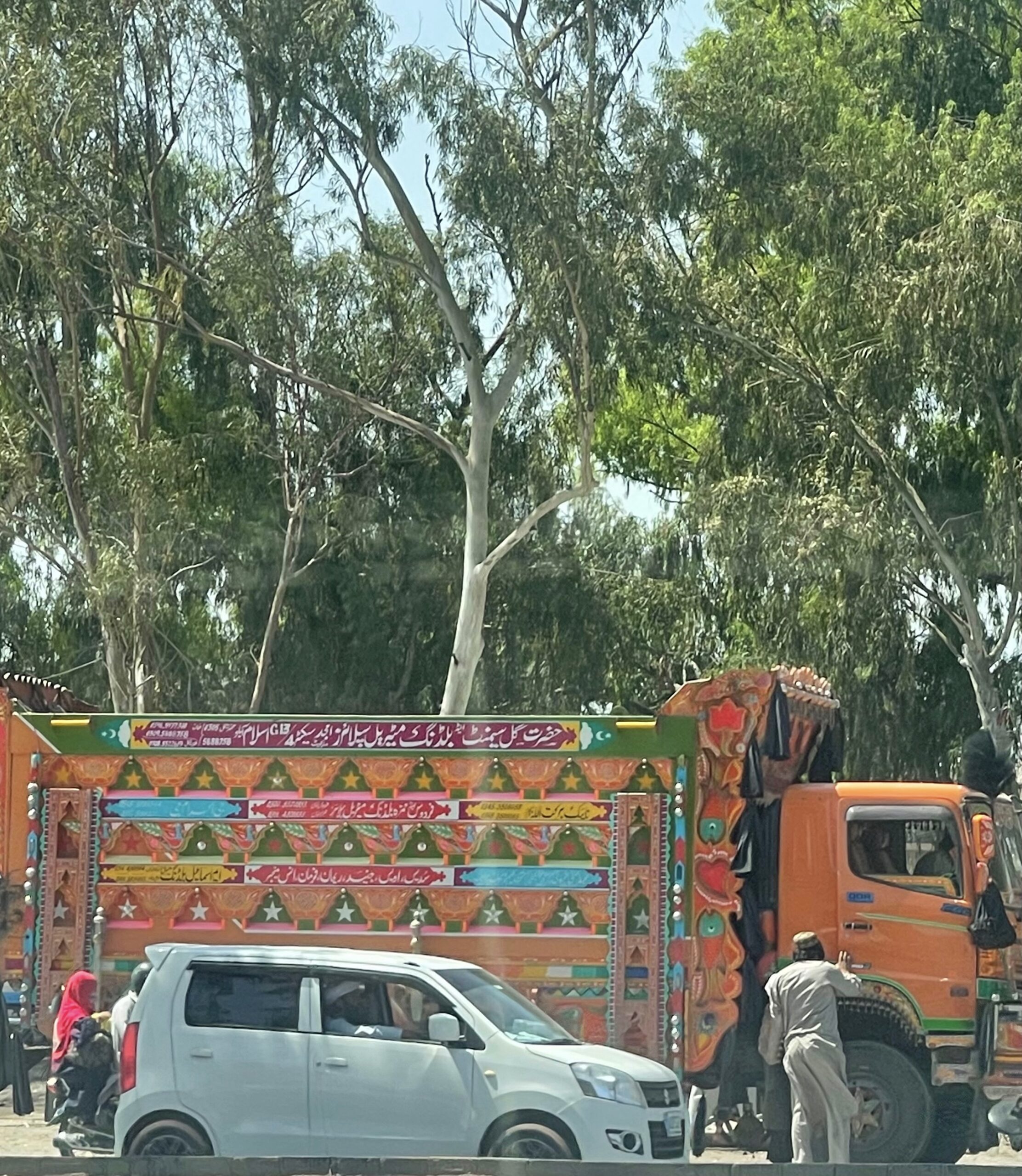
But there is one way you can see a truck up close and personal and perhaps like me, even get to climb inside…
Seeing inside a Pakistani truck
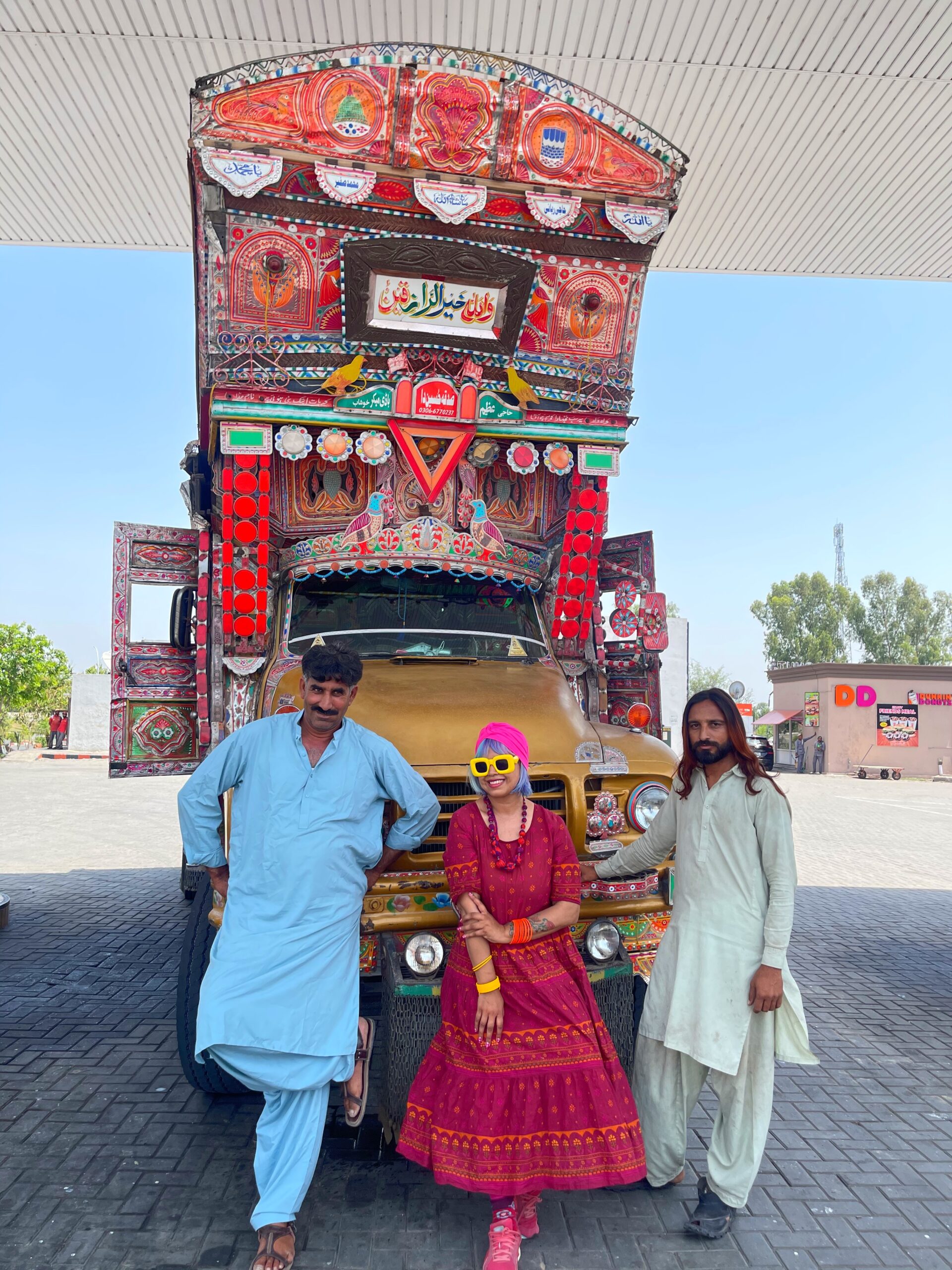
My impromptu, unplanned but dream photoshoot with a truck came from seeing one parked up at a service station stocking up on fuel. The owner Azmat Hayat was extremely hospitable and let me and my fellow travellers have a good peek inside and take photos; an experience I will forever be grateful for.
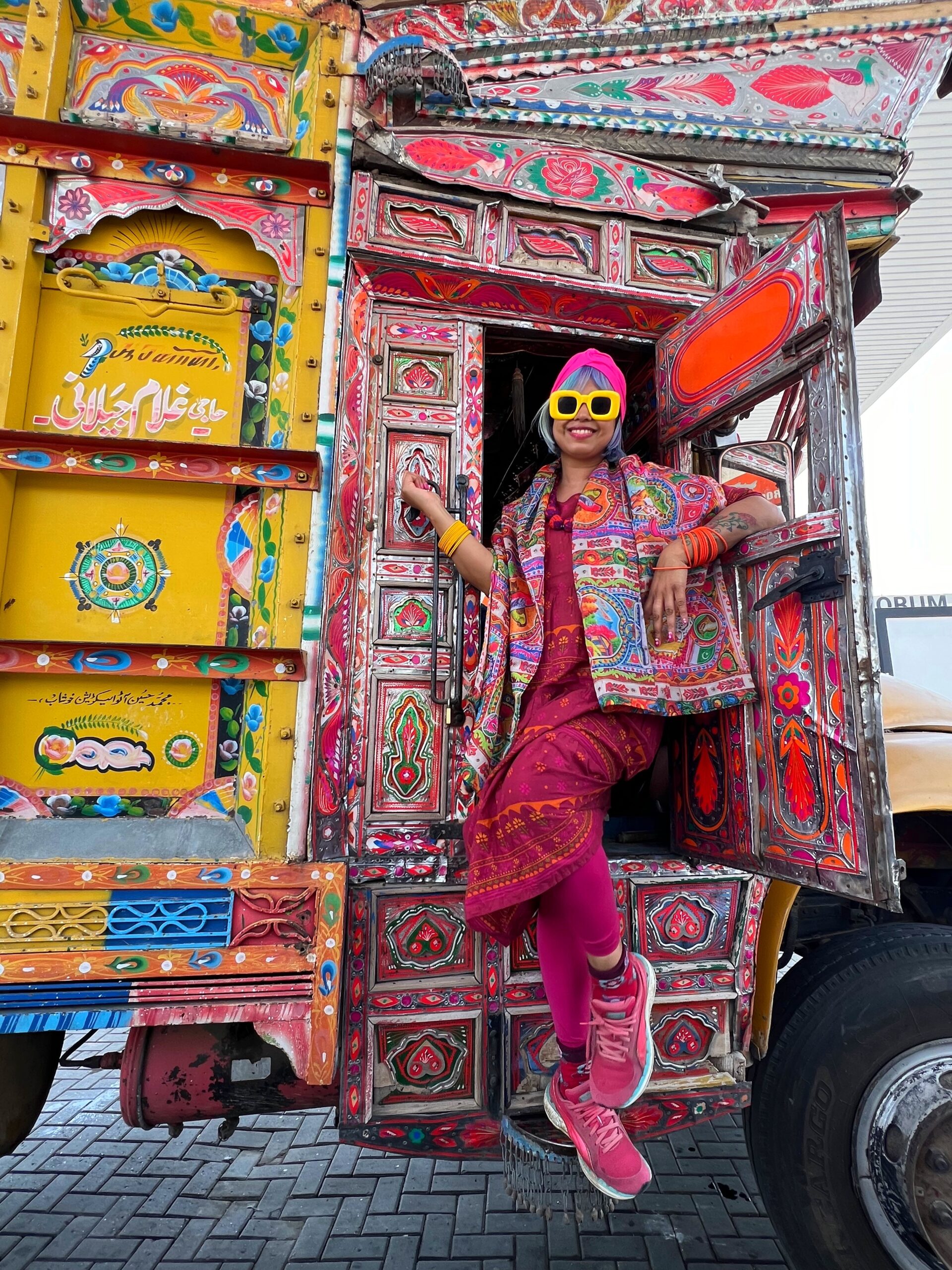
Azmat and his assistant were impressed I managed to climb up in a dress; the door and front seat are high up. Every detail of the truck was exquisite from the hand-painted details to bells, trinkets and woodwork. This was a loved truck that had seen a lot and no doubt its wheels had many tales to tell.
I’m confident that if you pull over at a service station at some point you will see a truck like this, but the one we stopped at was called Bhera North and there’s a Bhera South too. It’s on the drive between Islamabad and Lahore.
Pakistani truck art at Islamabad airport
On an internal flight from Gilgit to Islamabad, I was surprised to discover that the airport’s luggage carousel belts were decorated with panels of Pakistani truck art created by truck art collective Phool Patti. Hands down, the most beautiful luggage collection point in the world.
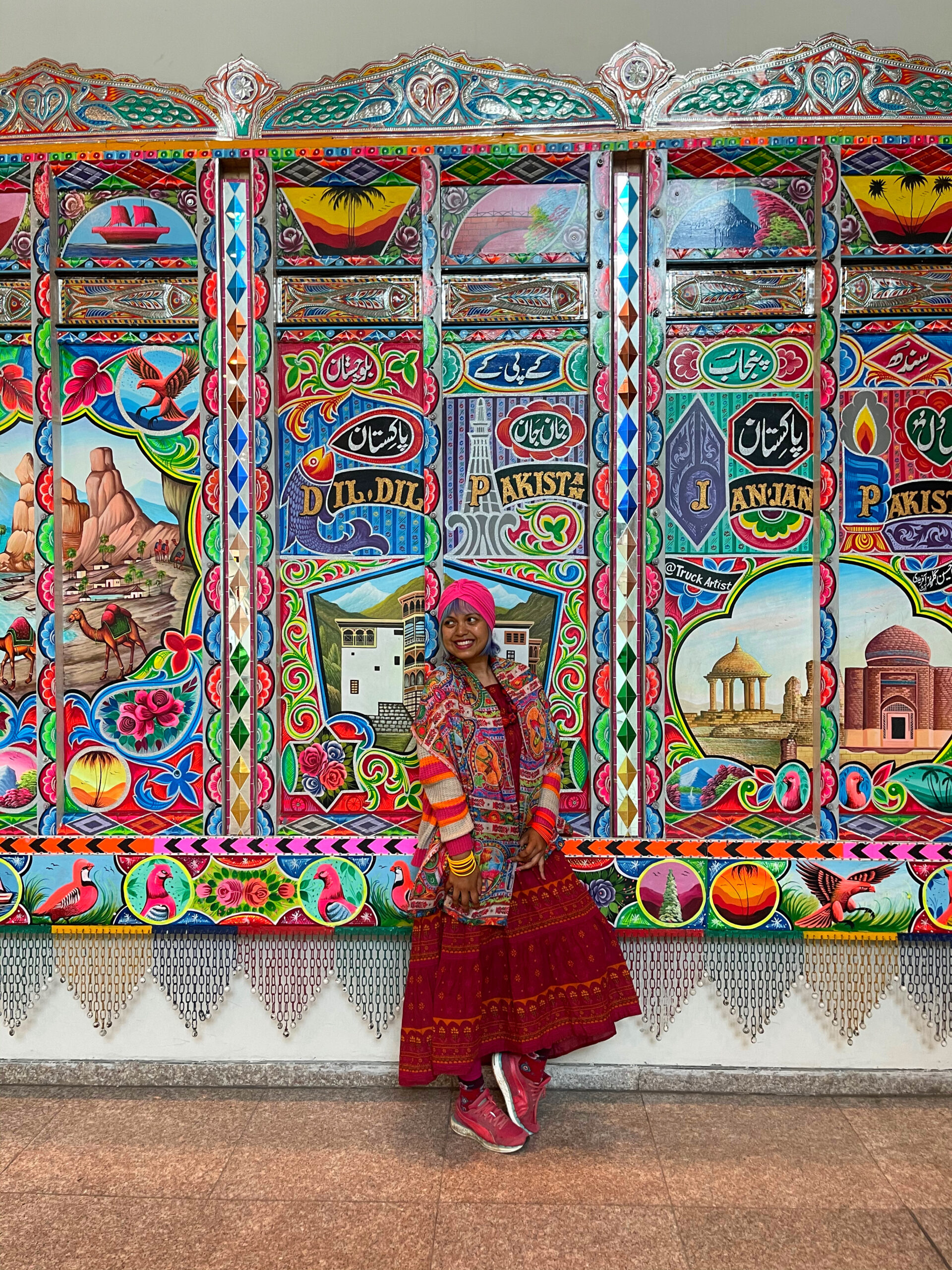
Every belt had a different design and there were 3D sculptural pieces juxtaposed against painted panels, metal, stickering and woodwork. If you’re travelling on a domestic flight in Pakistan, this section of Islamabad airport is a must-see. It’s a chance to appreciate the contemporary style of truck art that’s currently being created in Pakistan.
The strangest thing happened, while I was in Pakistan, the Phool Patti artists who created the airport artwork were actually in London promoting their art. I’ve been following them online for sometime and I couldn’t believe they travelled all the way from Pakistan to my hometown when I wasn’t even there – what are the chances?
Beyond, the truck. How the traditional technique of Pakistani truck art transformed a nation with colour
It’s not just trucks that are embellished with art. Increasingly, you’ll see the inspiration appearing on other vehicles from tuk-tuks to public buses and bicycles. I even saw bins painted with floral motifs.
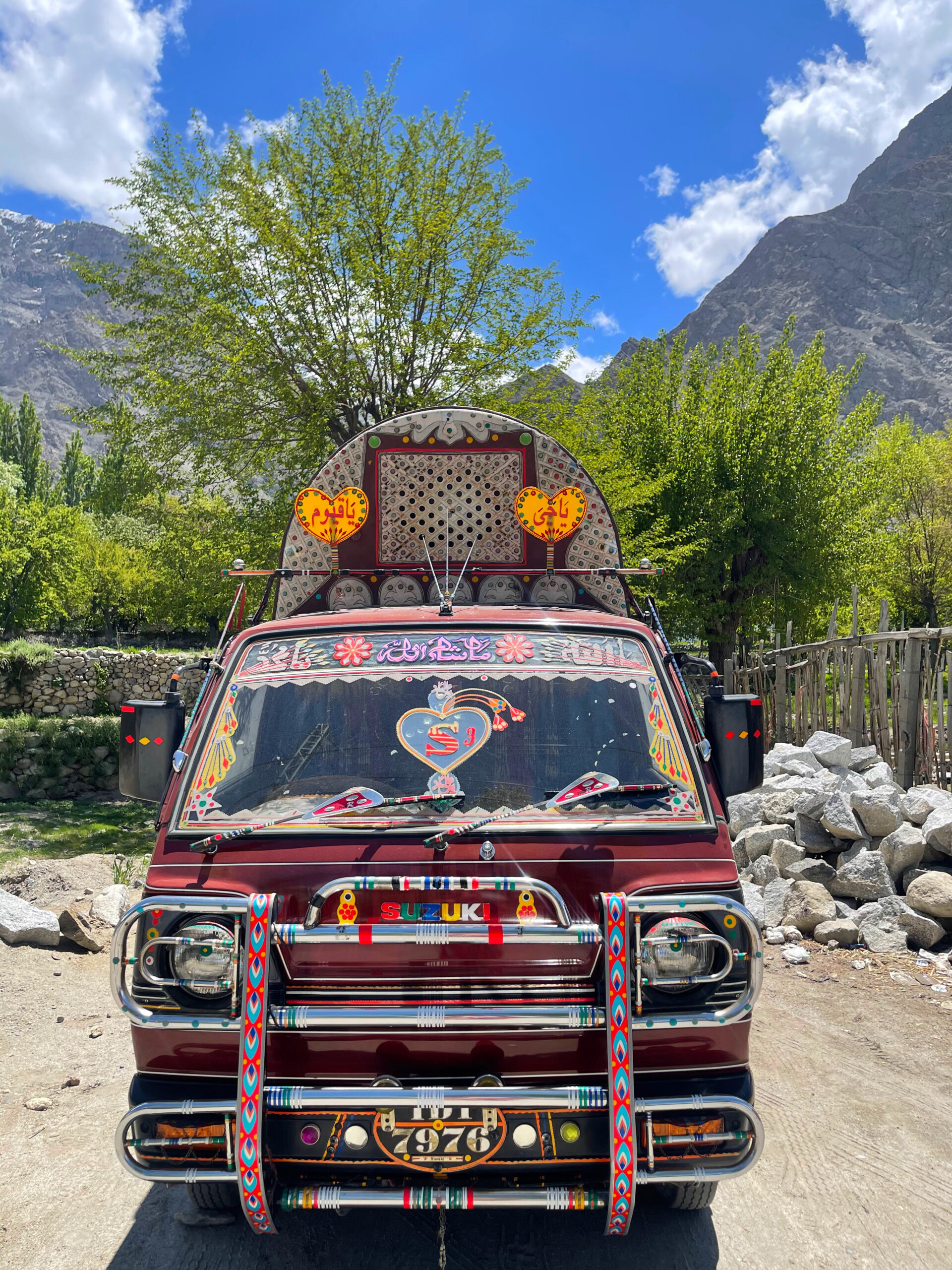
You can even commission artists to transform your car or motorbike or opt for non-transport related artefacts.
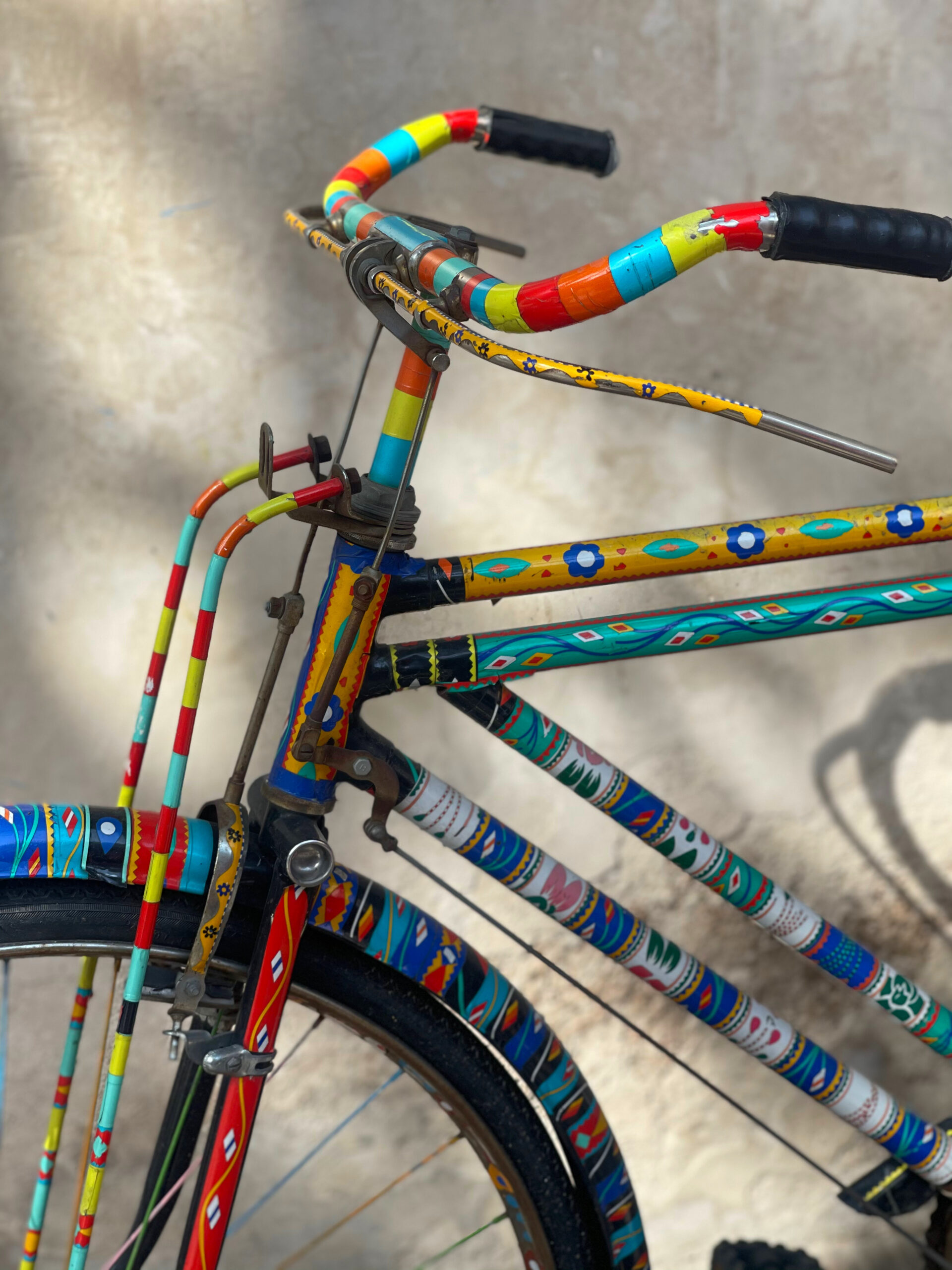
On my travels I saw all manner of hanging signs, vases, kettles, cups and even clothing with a Pakistani truck art aesthetic. Speaking of clothes, I bought two truck art scarves, a handbag and trolley case.
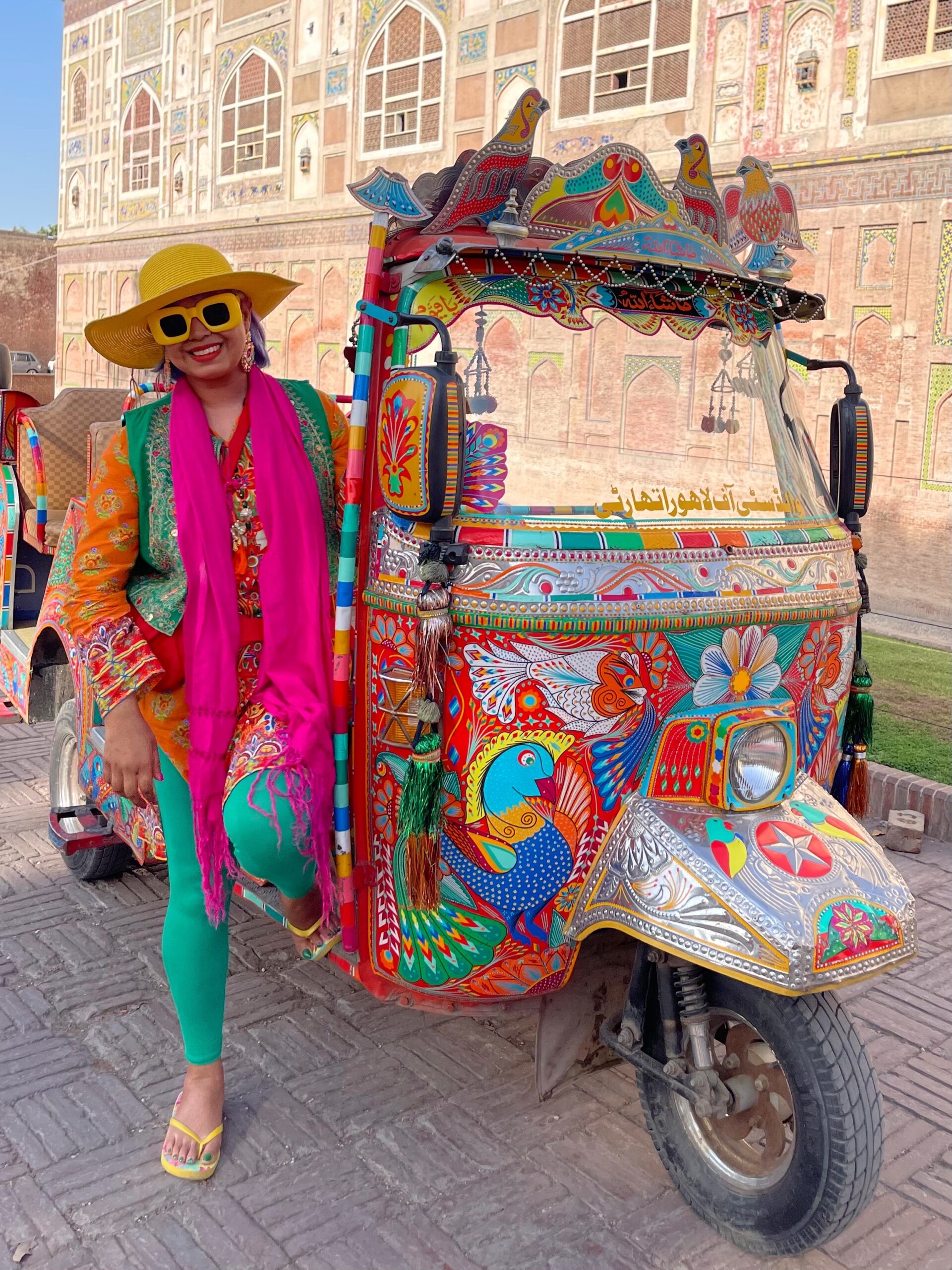
I also did a tour of Old Lahore in a truck art-inspired tuk-tuk, featuring classic motifs like parrots and patterns. It was the best-looking ride in the city.
Where to buy Pakistani truck art
The price of truck art varies, firstly it depends on the type you buy and secondly where you buy it from.
The two types of truck art you’ll mostly see for sale are hand-painted objects and the second is items created with the stickering technique.
I did my shopping from two places. The covered markets in Anarkhali Bazaar Lahore had the best value. This intricate handmade sign cost £4.
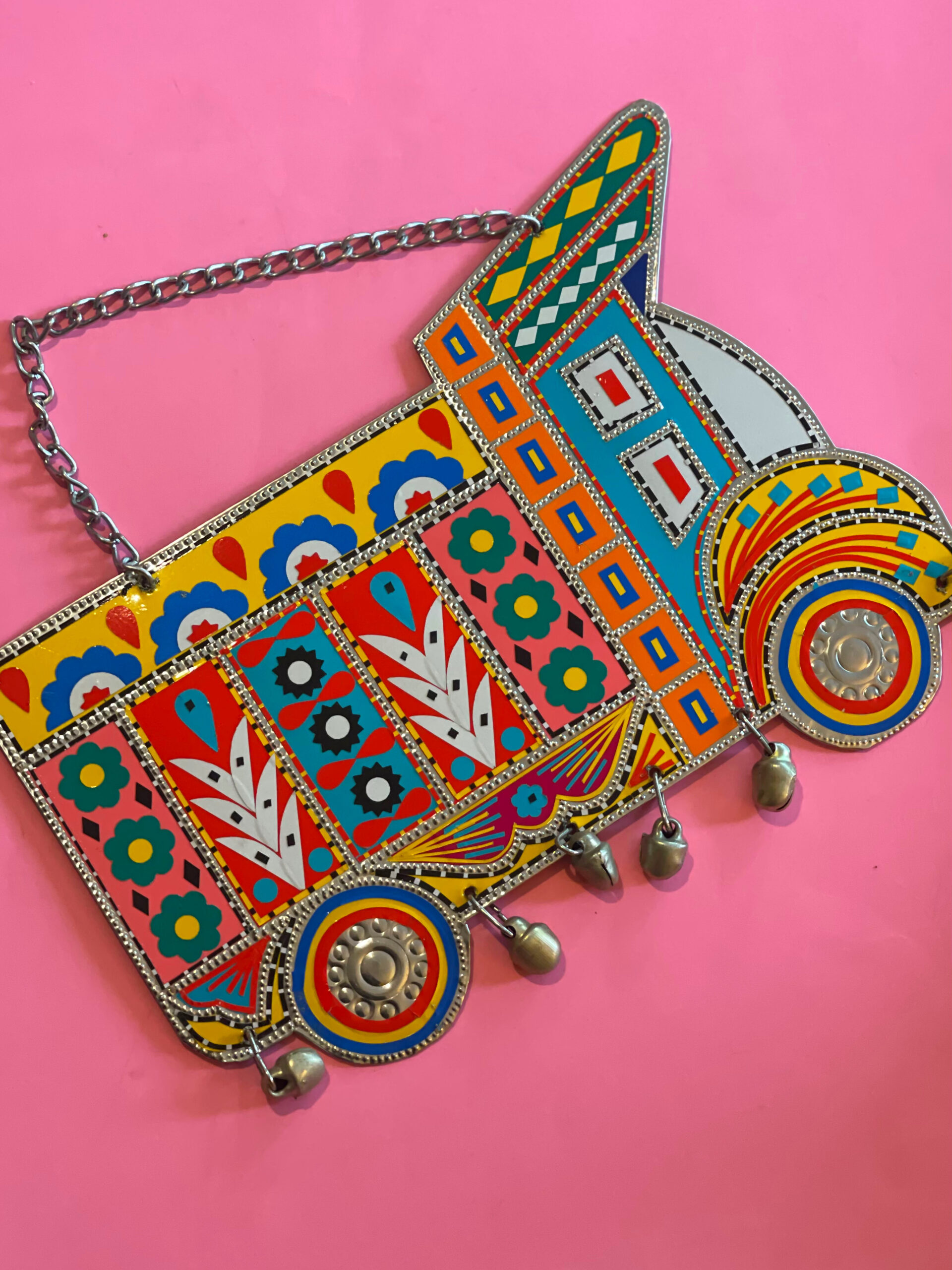
The most accessible place to buy truck art which has a fixed and reasonable price is to visit one of the stores by the brand Gul Khan. They have a shop in a mall in Karachi but I bought pieces from their stand at Emporium Mall in Lahore. Or, you can order online and yes – they ship abroad! Their pieces costly slightly more than the market but not much. A similar hanging sign is around £7.
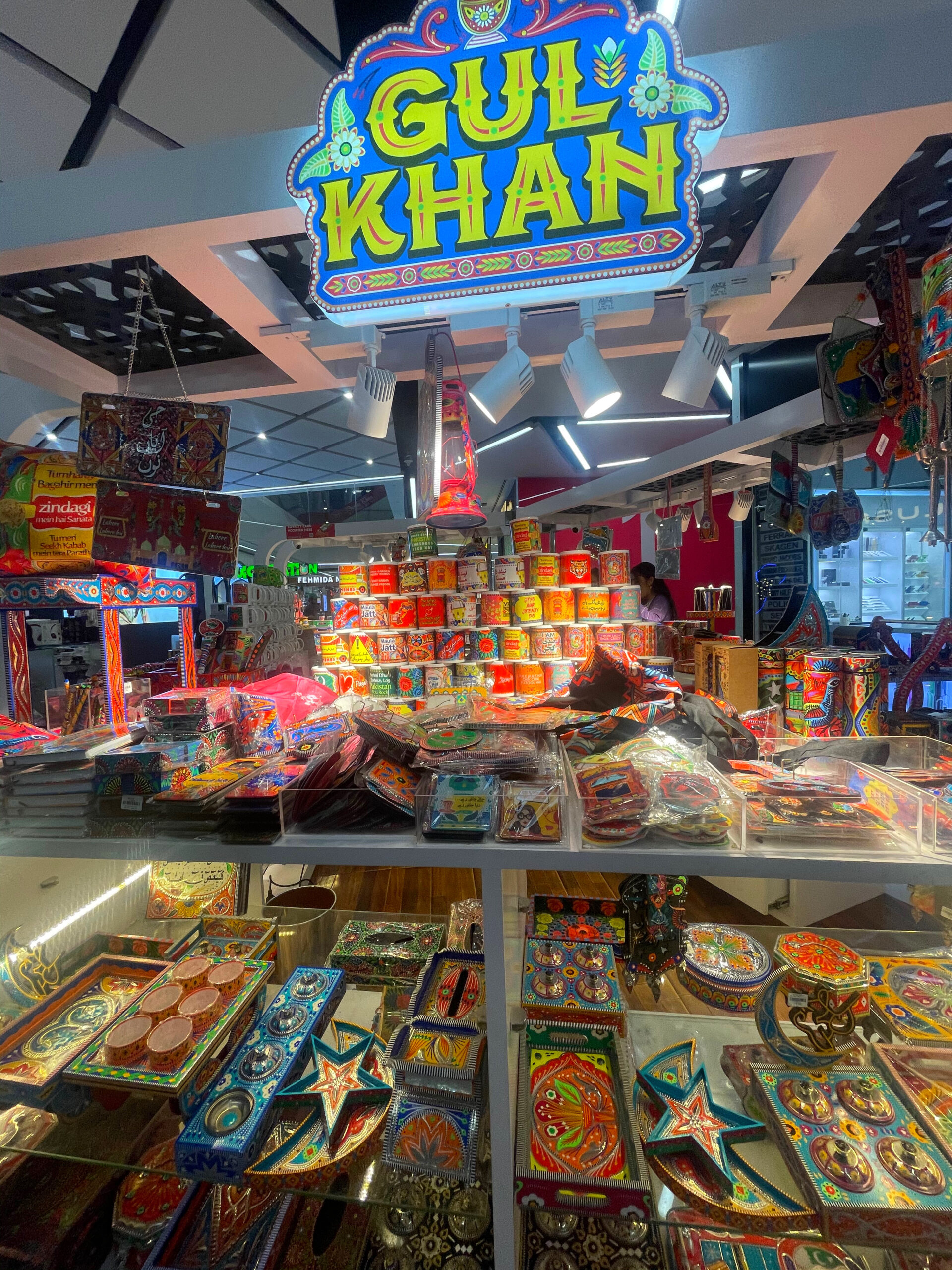
But what shocked me were the prices I saw at the upmarket hotel we stayed at in Islamabad. It had a gift shop inside and the truck art pieces there were more than double the prices at Gul Khan – a similar sign was around £15. It’s still cheaper than buying truck art in the UK (if you can track it down) but not worth entertaining when you can find it cheaper and, in my opinion, cheaper and with better designs elsewhere.
Pakistani truck art painting workshop in Lahore
Trying to arrange workshop with a Master Painter isn’t easy – they’re usually too busy and expensive. The next best thing is to attend one run by an appreciator of heritage and truck art. You can do this by booking a private session at The Lahore Heritage Club.
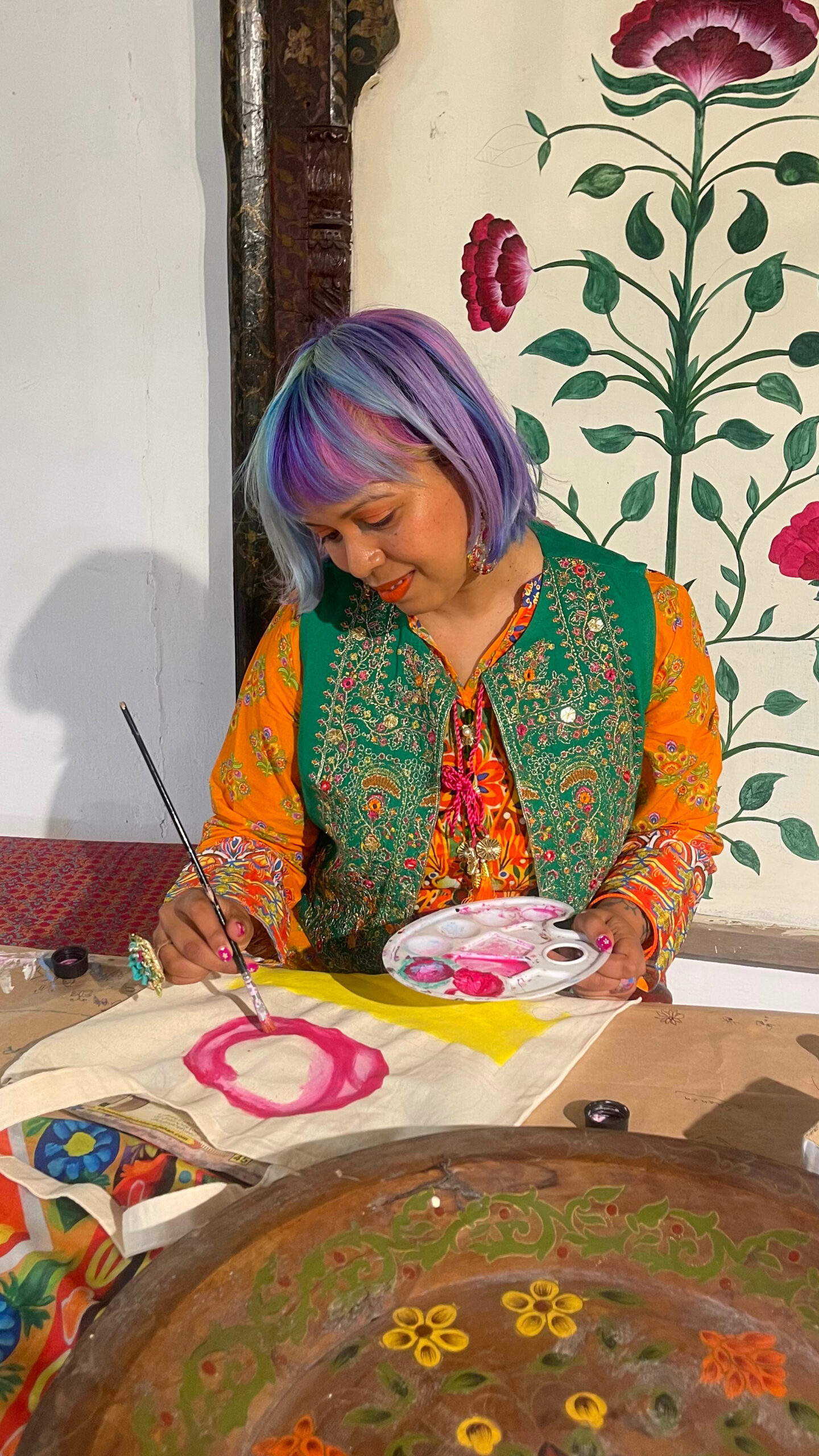
Co-owner Zarafshaan Yazdani gave us ideas and inspiration for using acrylic paints to create truck art-style designs. She went through the typical motifs you’d find on a truck like protective eyes, birds, wildlife, flowers and fauna.
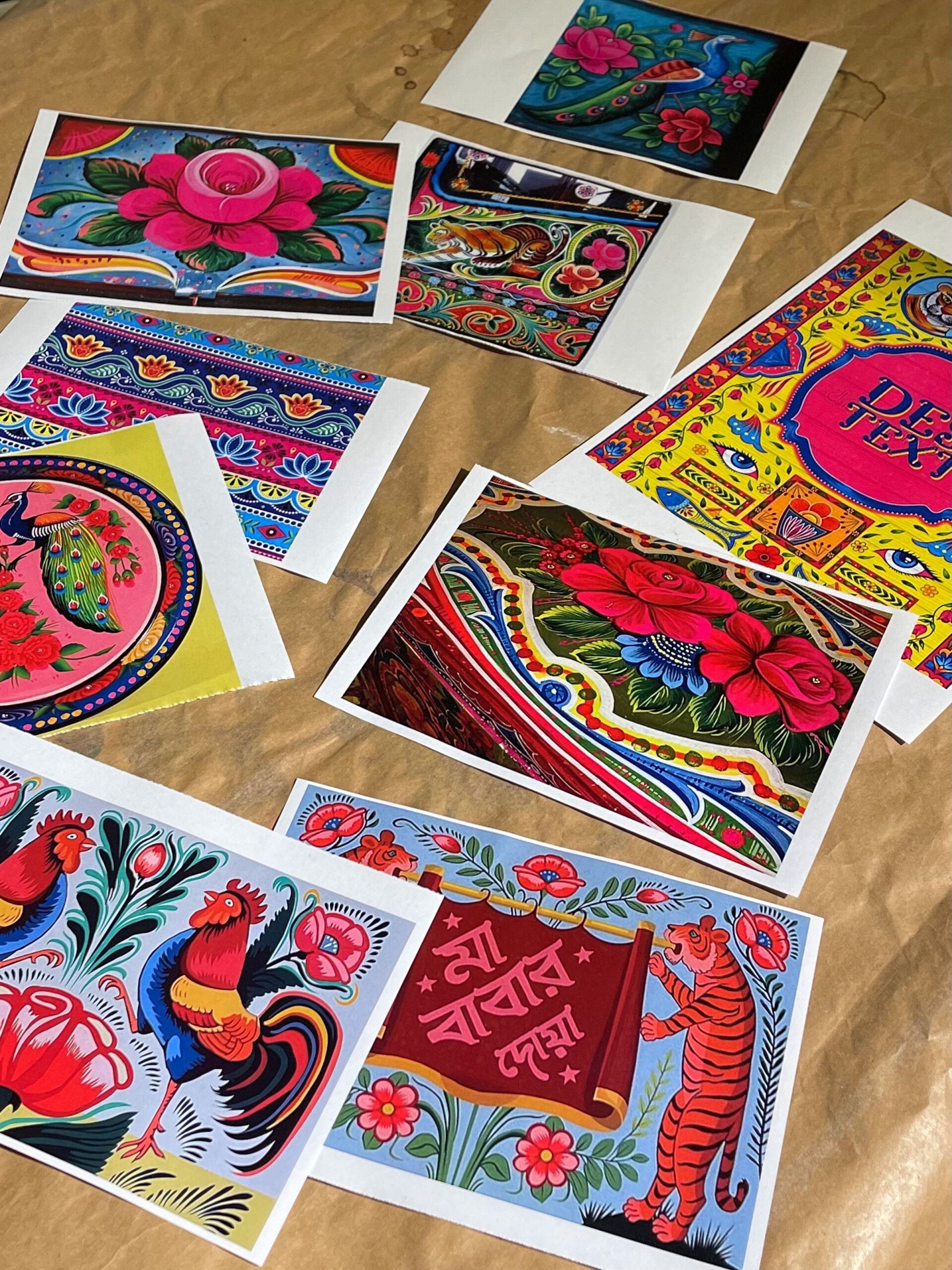
For my design, I added a word in Urdu too – my name! It took me a little while to get the hang of writing the letters but when I discovered you can lengthen each character as much as you like, it became much easier to fill space, since Momtaz is a short word.
The painting was done in three stages. First, placing the big shapes like the large flowers on my design, then adding light areas by mixing in white paint and finally using a fine paint outliner to accentuate details.
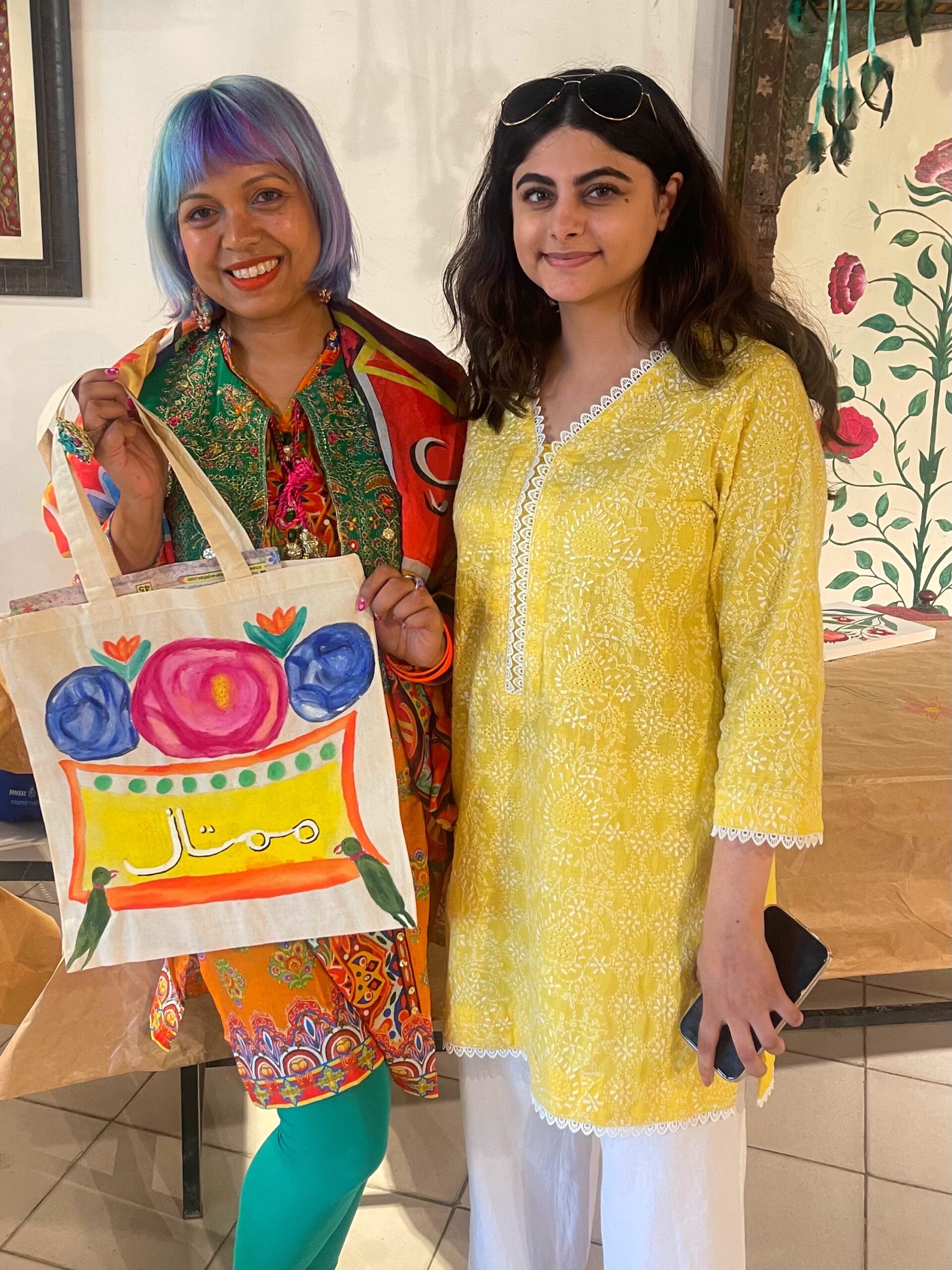
It was a fun and relaxing session and a workshop I’d love to revisit and try again.
DIY Pakistani truck art sticker decorations
Having purchased some Pakistani truck art a few years ago in the UK that used the stickering technique I was eager to see if I could recreate it myself.
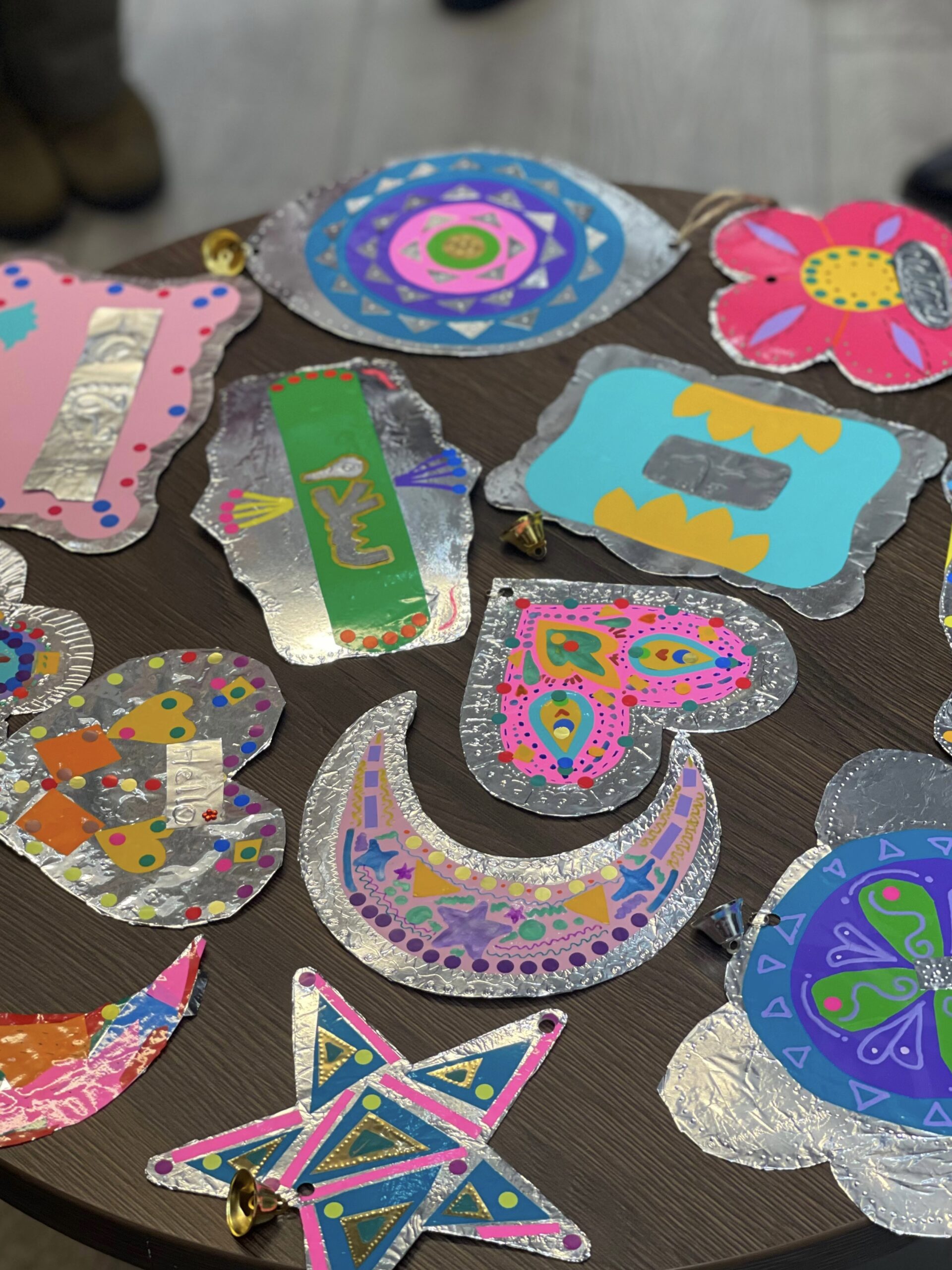
I devised a method that’s easy, affordable and makes for a fun activity for craft workshops. I’ve run these sessions in London three times so far (before I’d been to Pakistan) but now I’ve returned and seen Pakistani truck art in real life, I’m excited to run more workshops inspired by the designs and ideas I saw.)
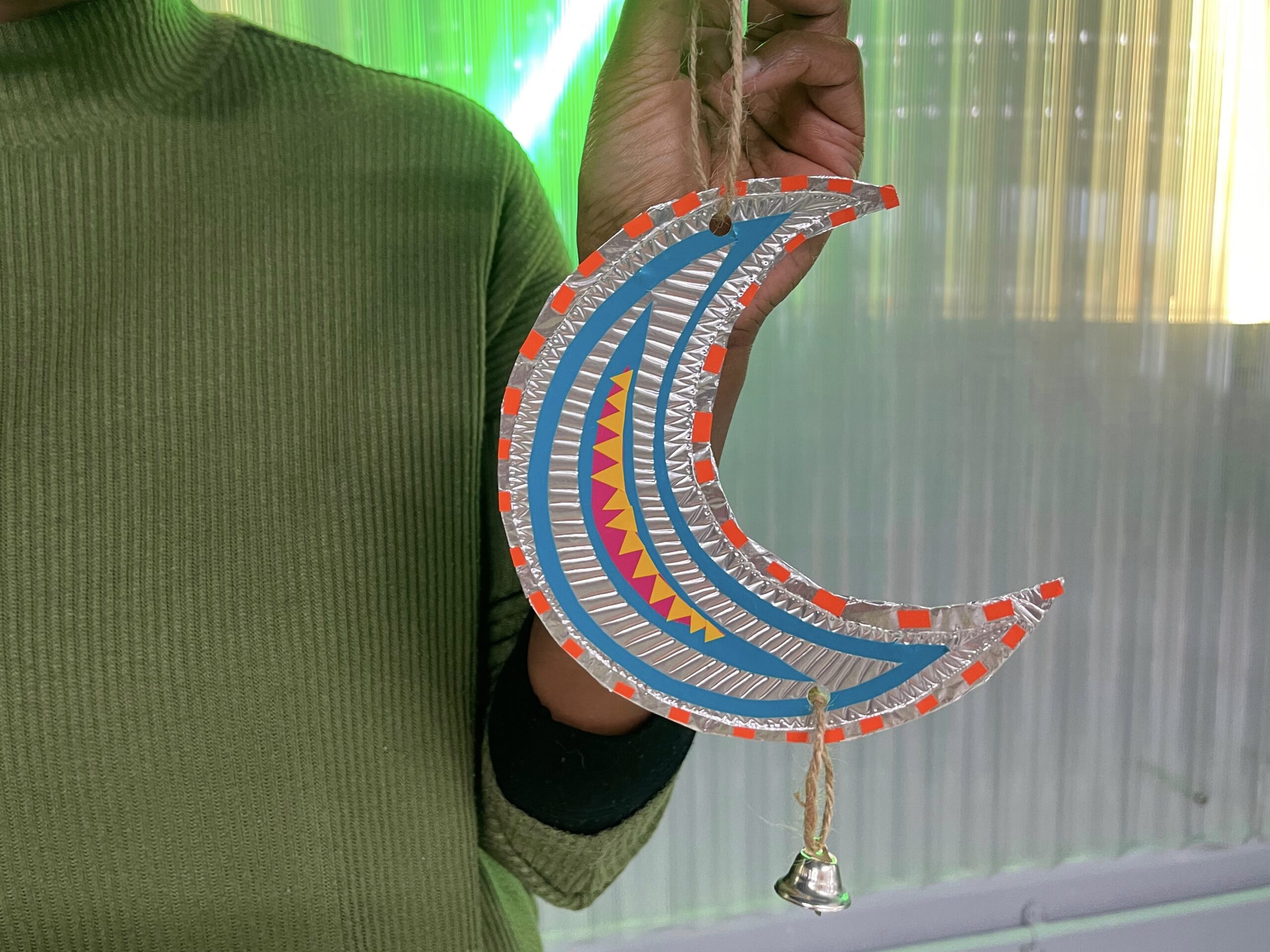
If you’d like me to run a Pakistani truck art workshop for an event or private workshop, drop me an email. Otherwise, here’s a simplified version to make your own Pakistani truck art hanging decoration yourself:
Craft materials
- Tin foil
- Card
- A paper template of your shape
- Self-adhesive vinyl sheets in different colours
- Glue stick
- Pencil
- Scissors
- Single hole punch
- String
(optional: a small metal bells)
Instructions
Take your paper template, draw around it on the card and cut it out. The shape is up to you. It could be a heart, star, moon or a shape that looks like a sign.
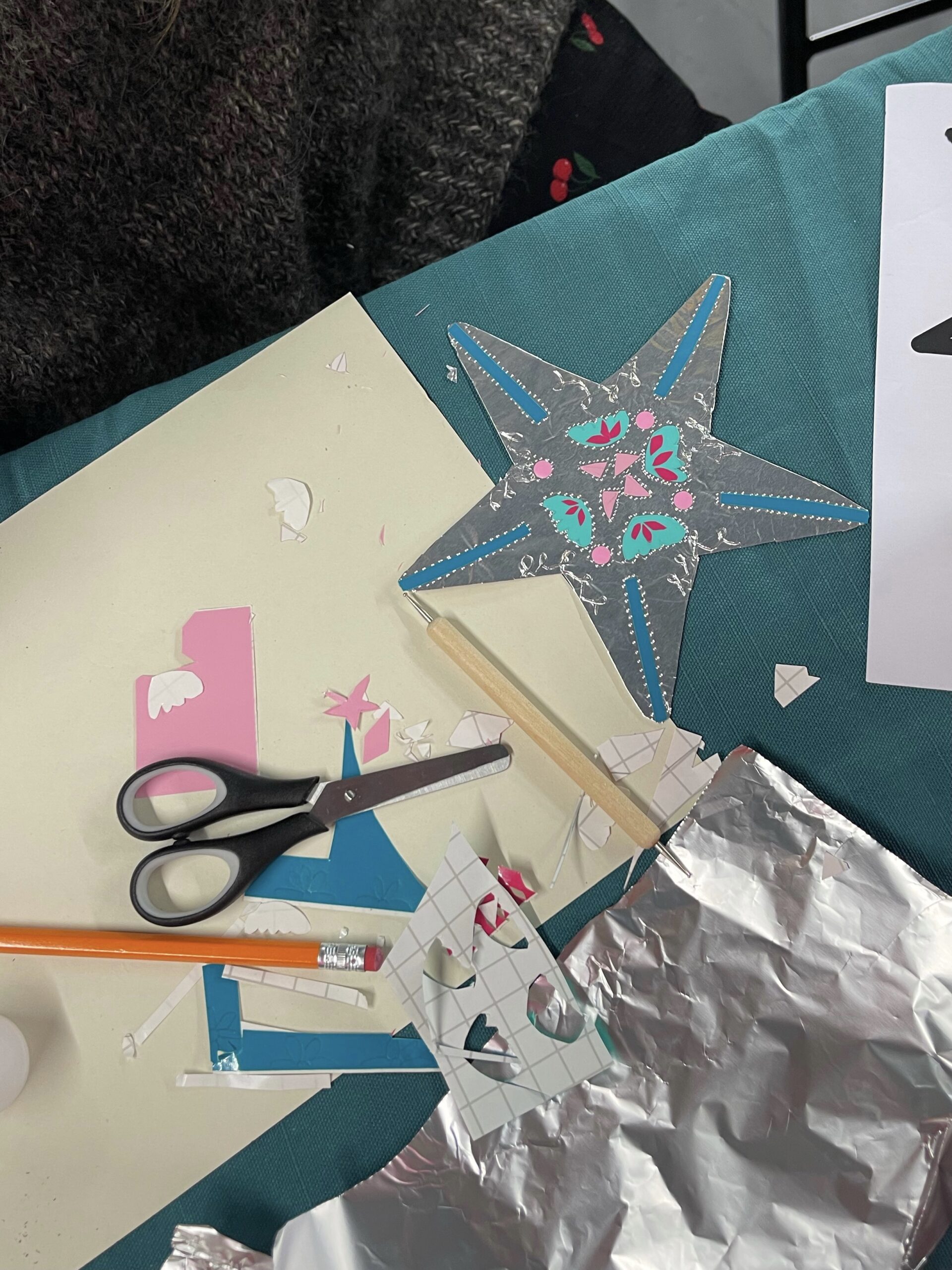
- Cut a piece of tin foil. It should be larger than your card template by about an inch all the way around.
- Cover the card shape in glue. Stick the foil down in the centre and smooth it out so there are so lumps or bumps.
- Turn the template around to its back. Trim off the excess foil leaving around 1cm all the way around. Then cut slits all along this edge of the remaining foil. Apply a layer of glue around the edge of the card and then fold in all the slits so that the foil is neatly stuck down. You can cut out another piece of card the same size and stick it over the back so you don’t see the foil edge.
- Next, plan your design using the coloured vinyl stickers. Use a mixture of large shapes and small strips of colour for any details.
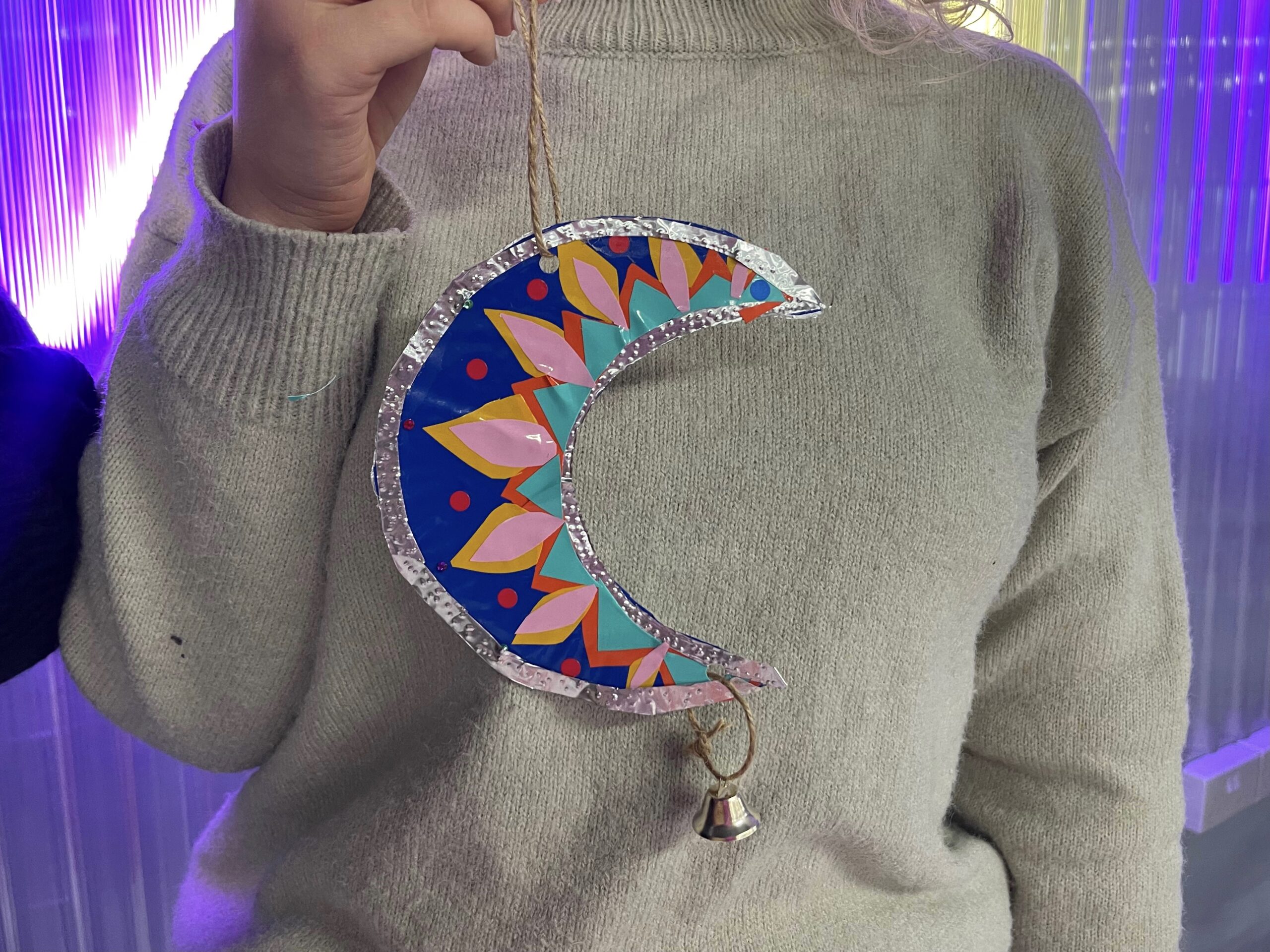
- When it’s done, you can hang up your design by punching a hole through the top and tying some string through. You can also punch a second hole at the bottom and hang off a bell, or two!
These photos are some of the creations made by participants at my truck art workshops in London. If you decide to give this project a go let me know by tagging me in any images so I can see your masterpieces!
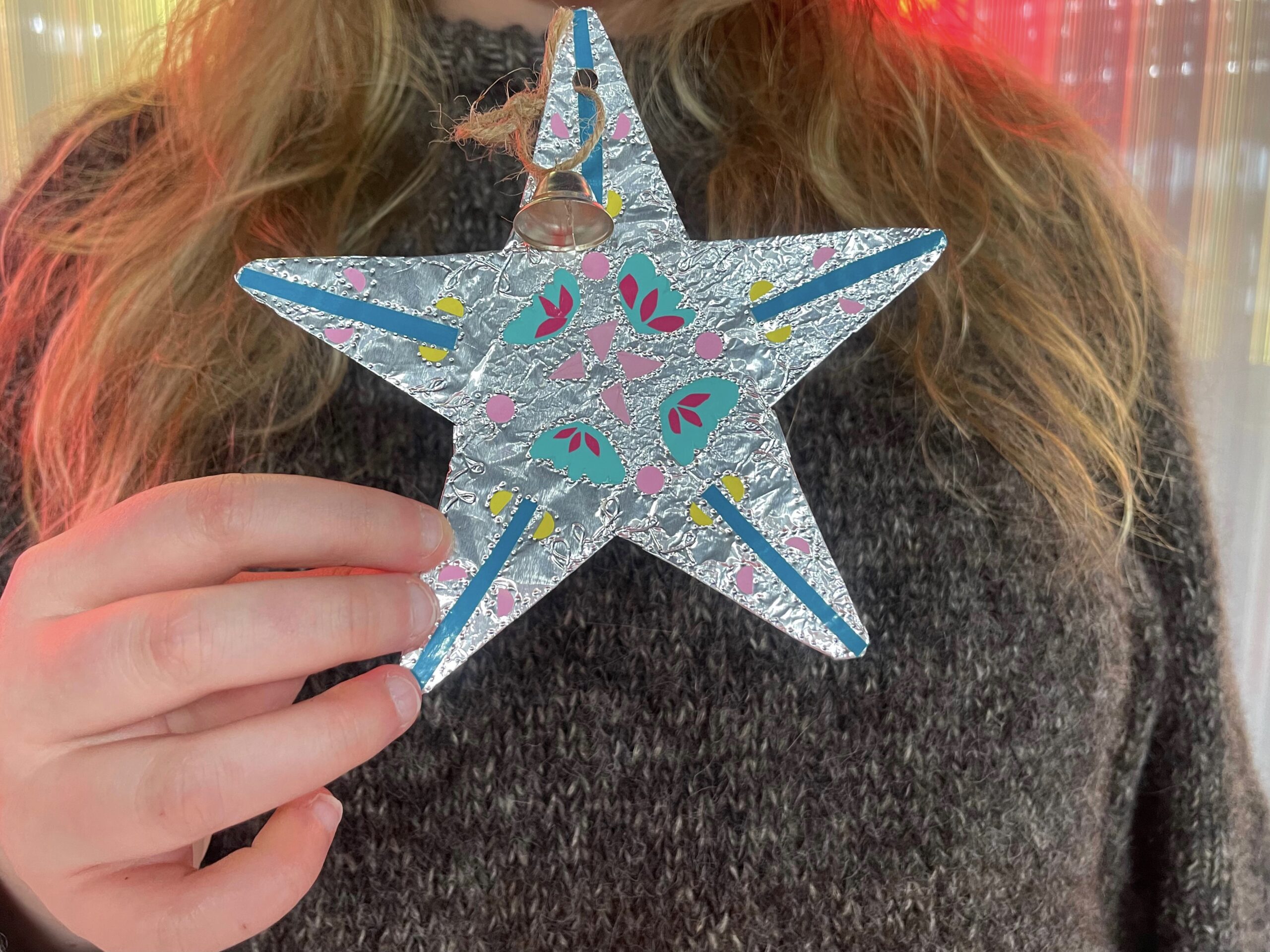
Fancy visiting Pakistan yourself to track down truck art? Follow Sophie Hussain on Instagram, who organised the trip I went on for future dates and check out the regular tours by Aatir Virani.
